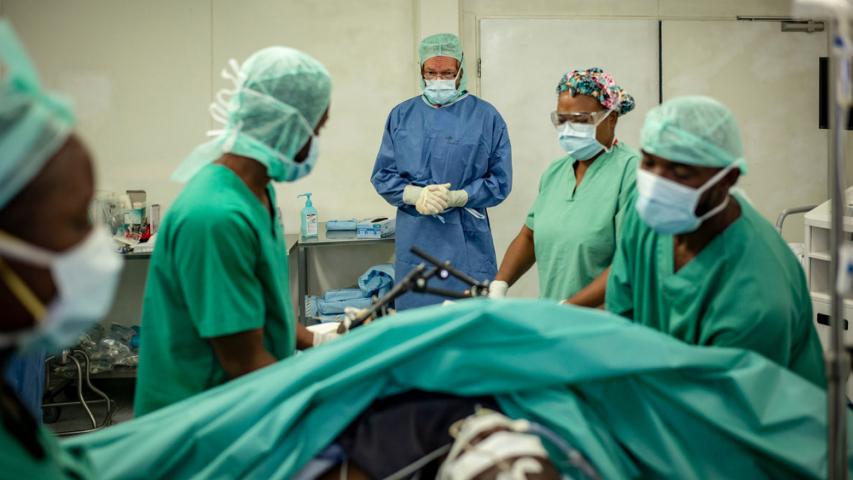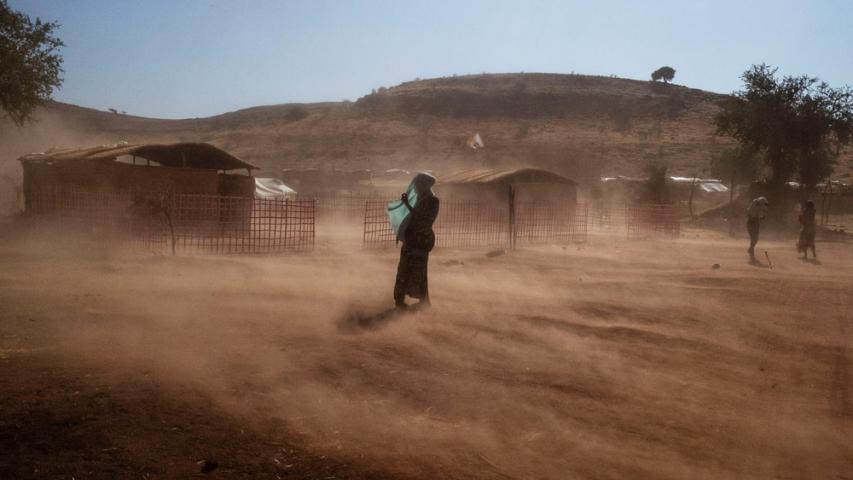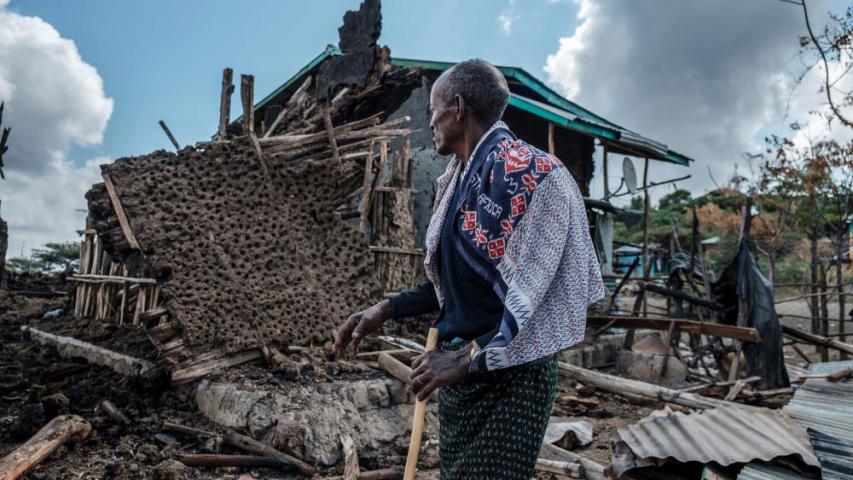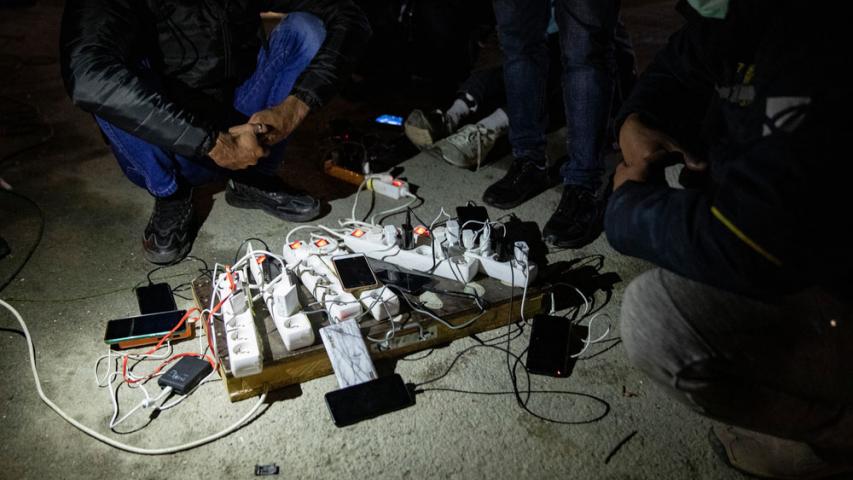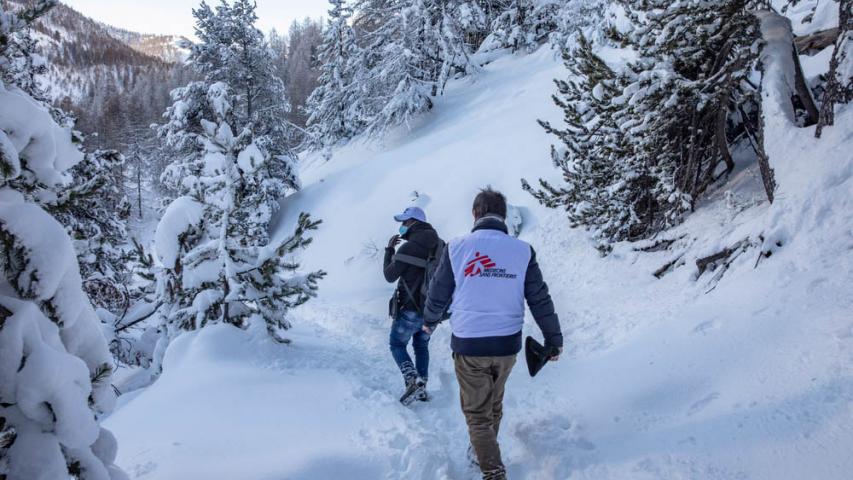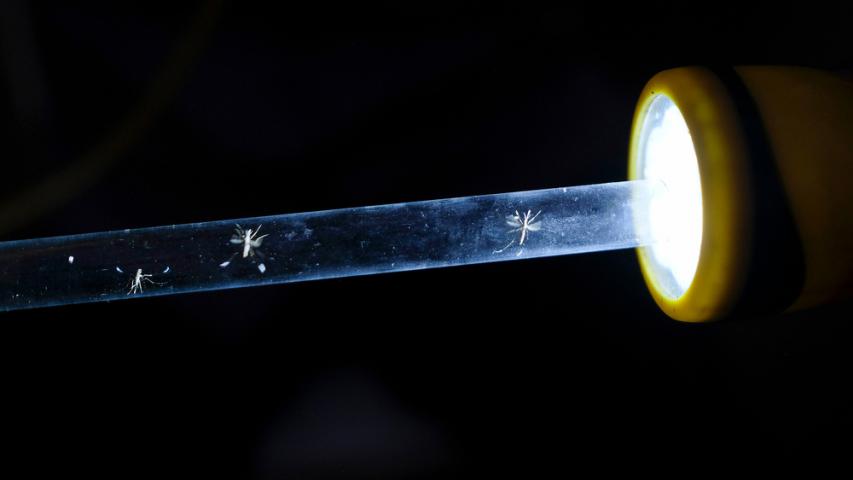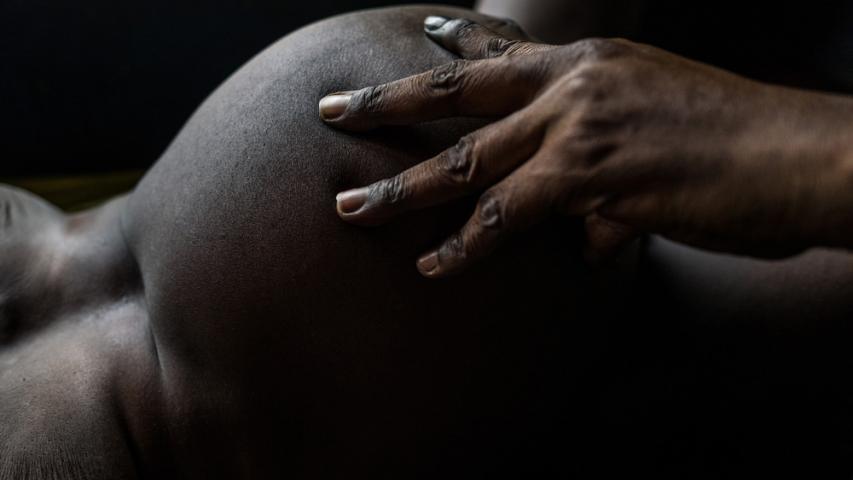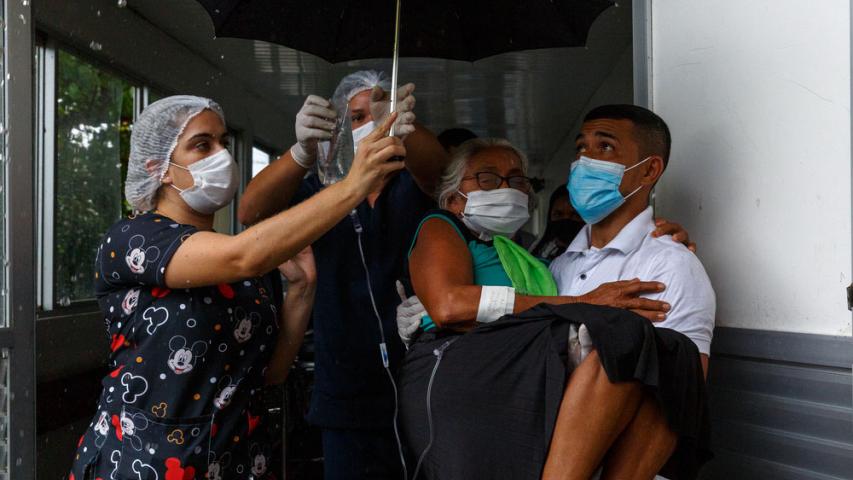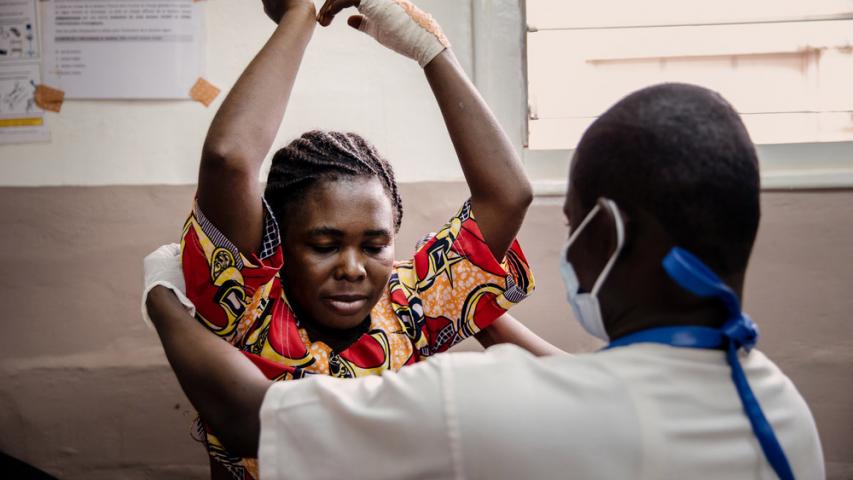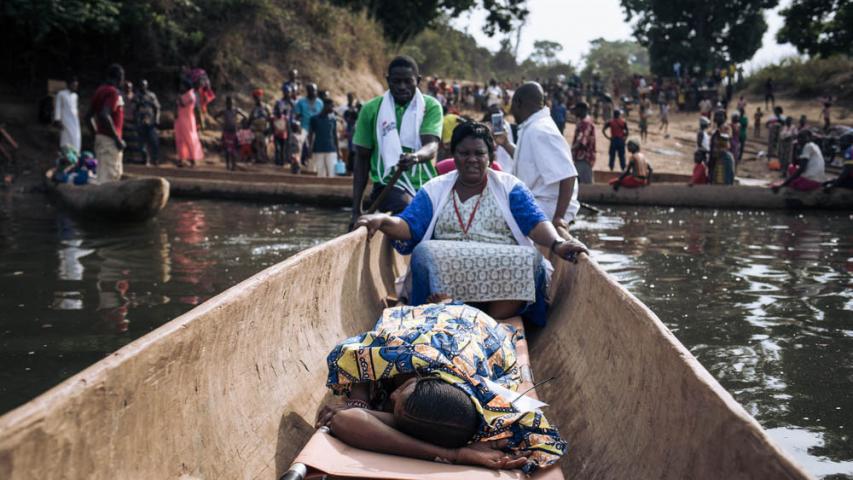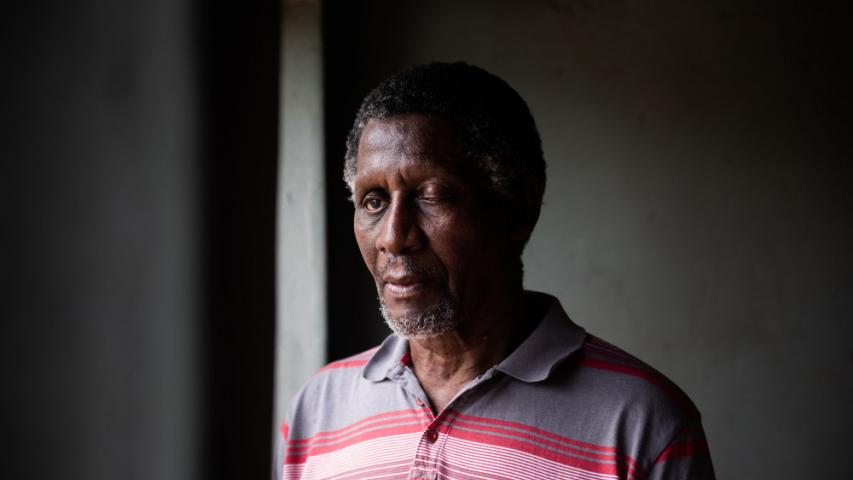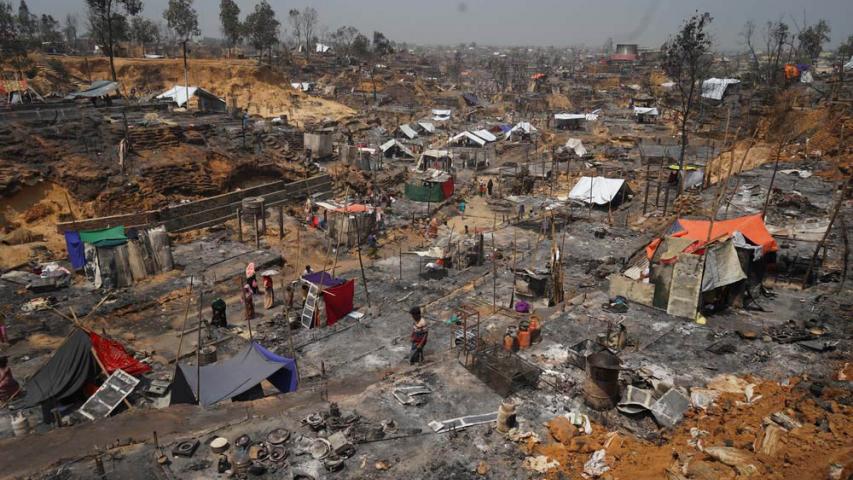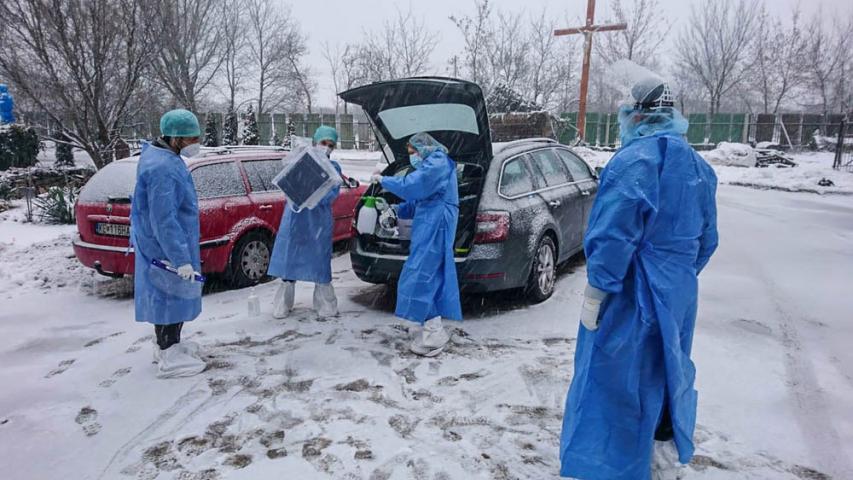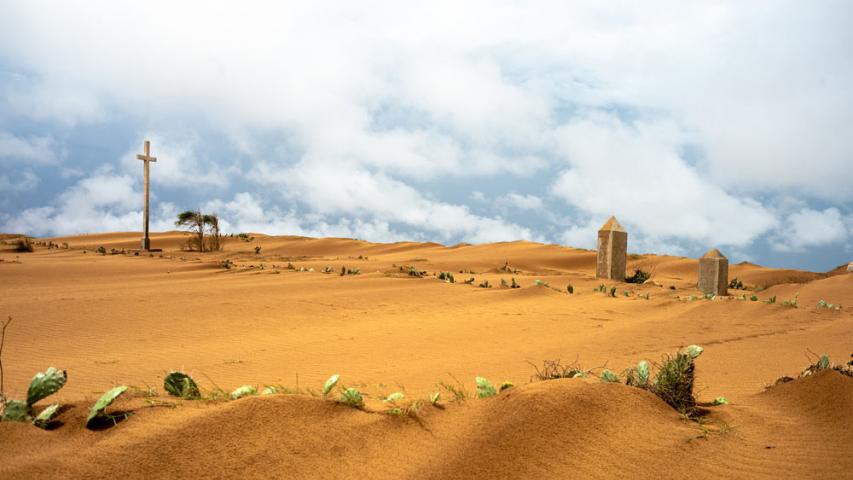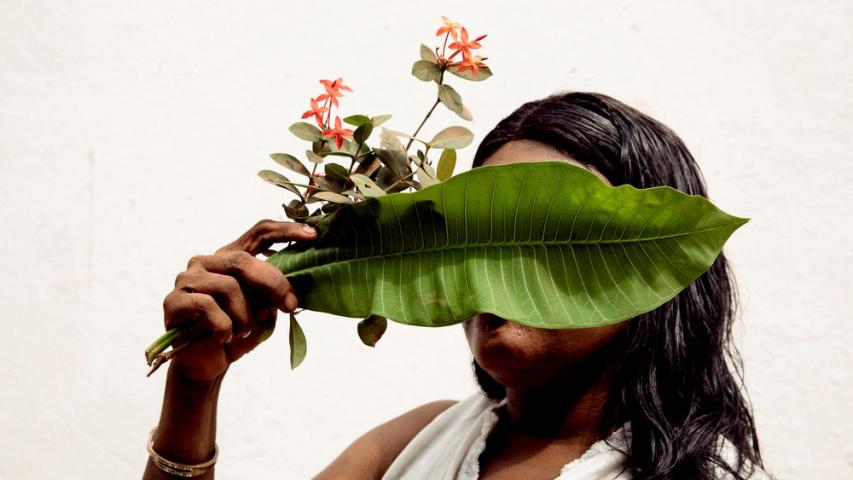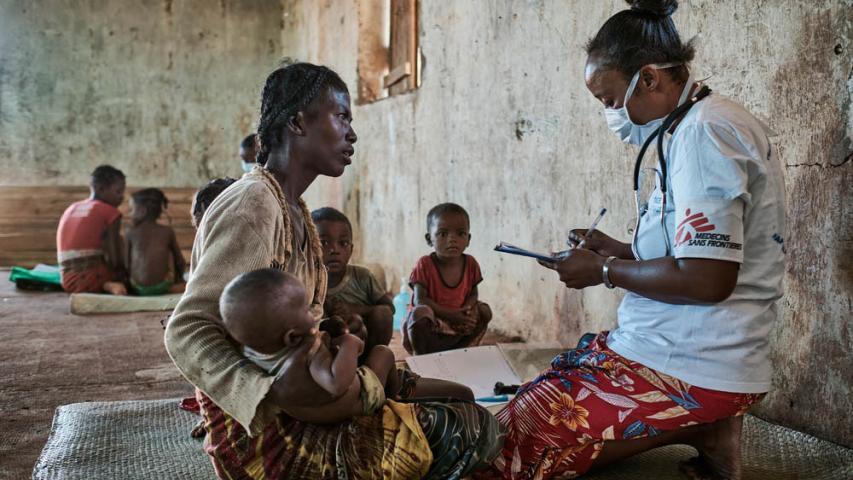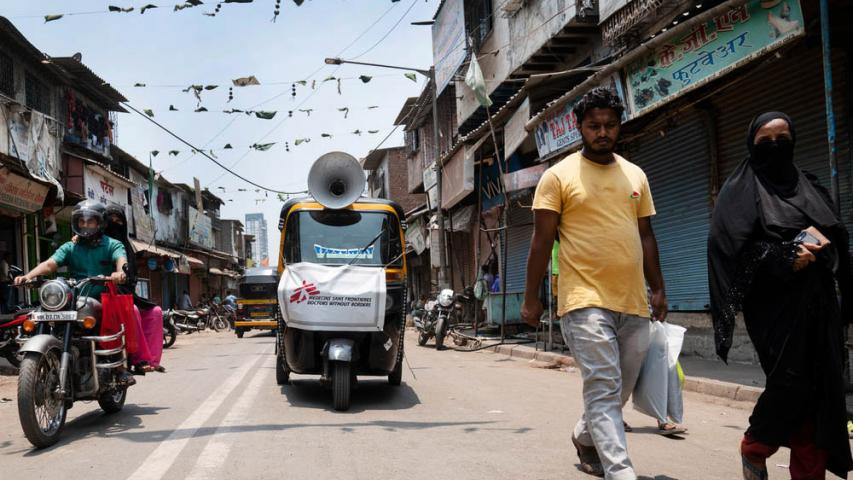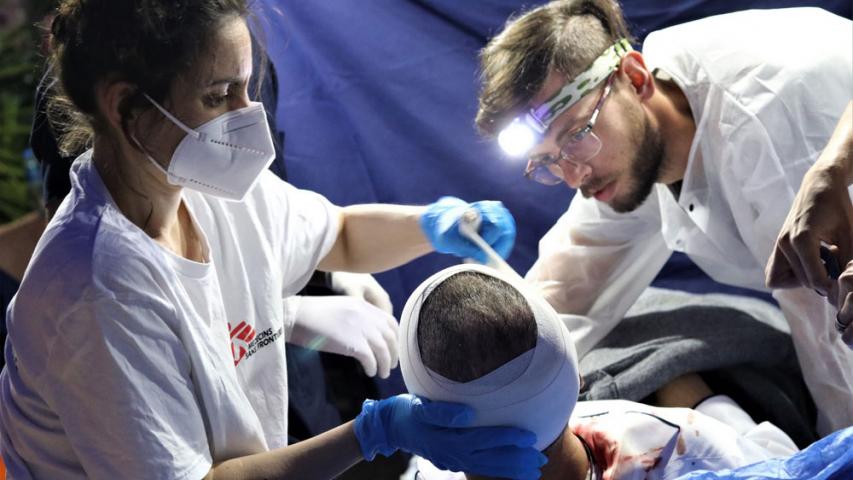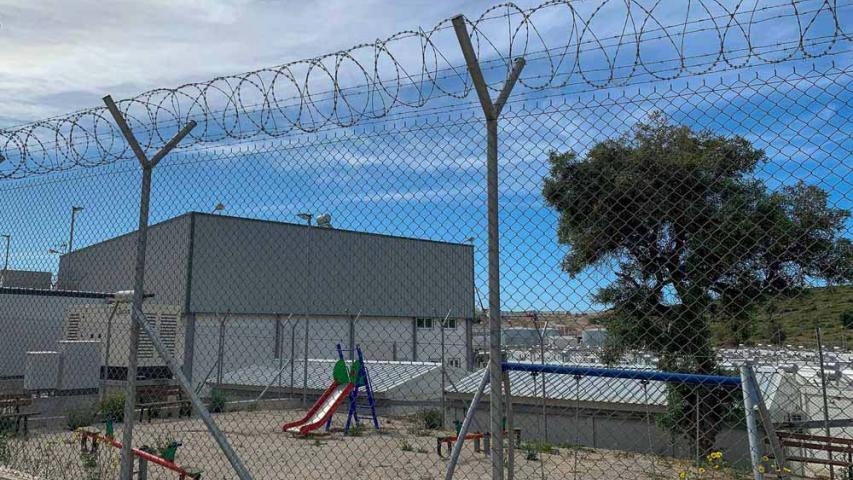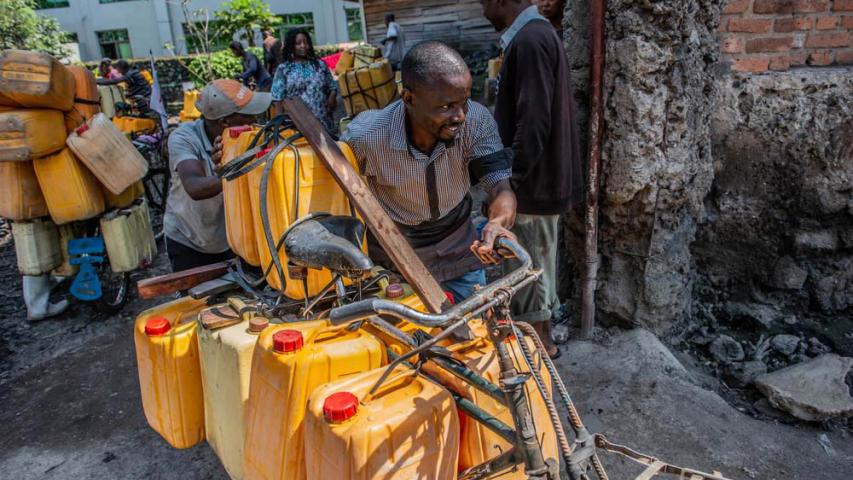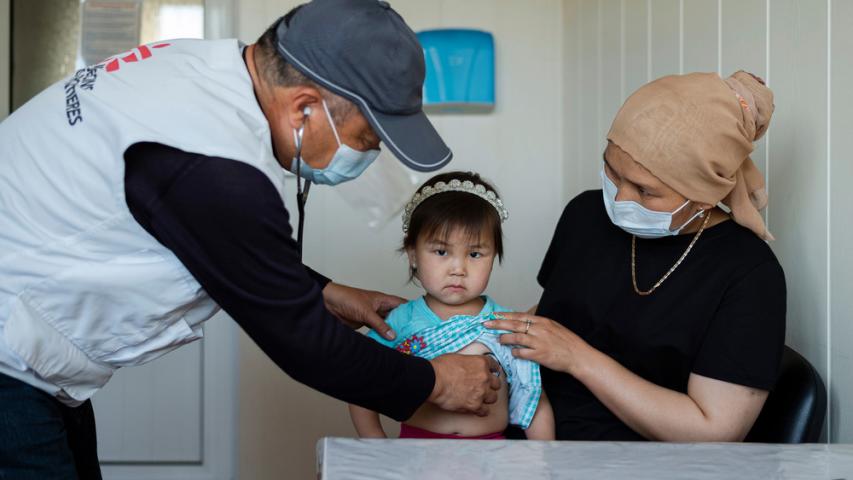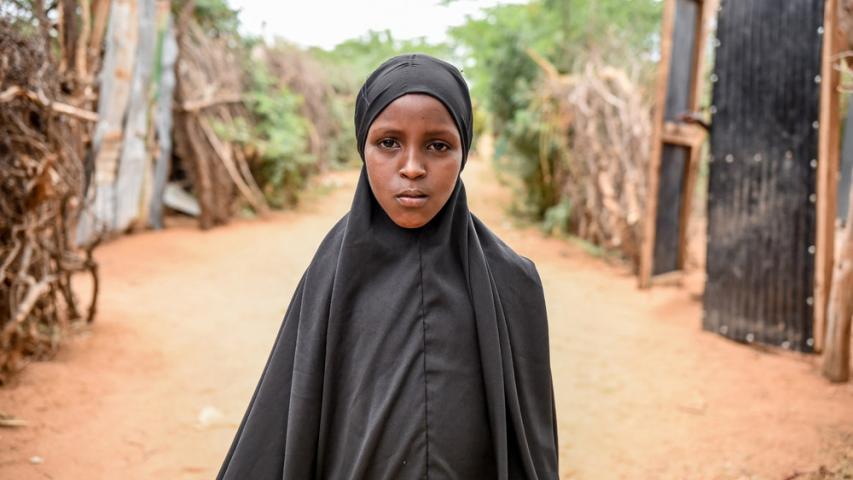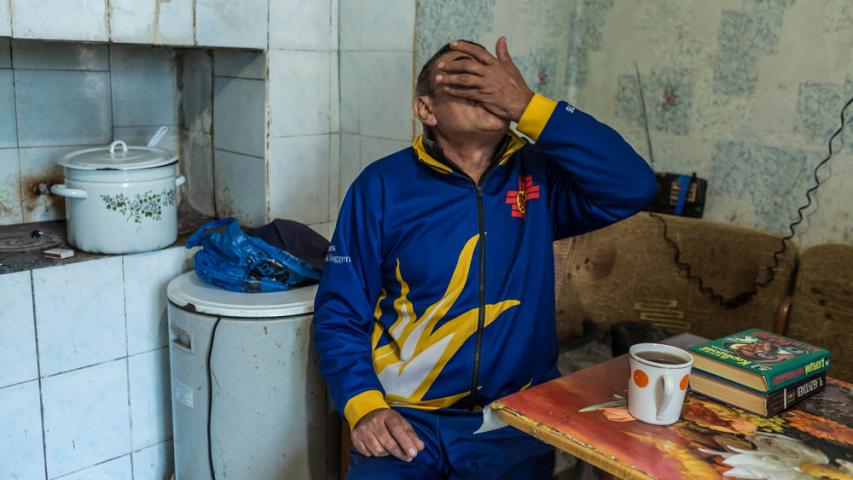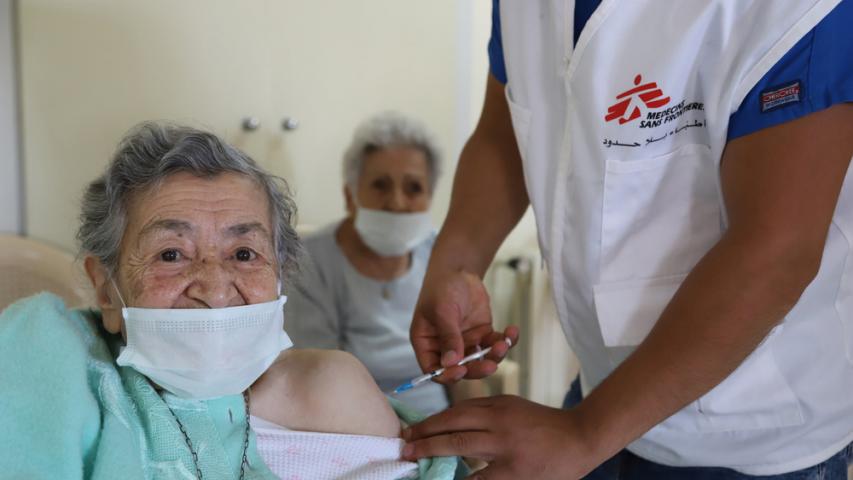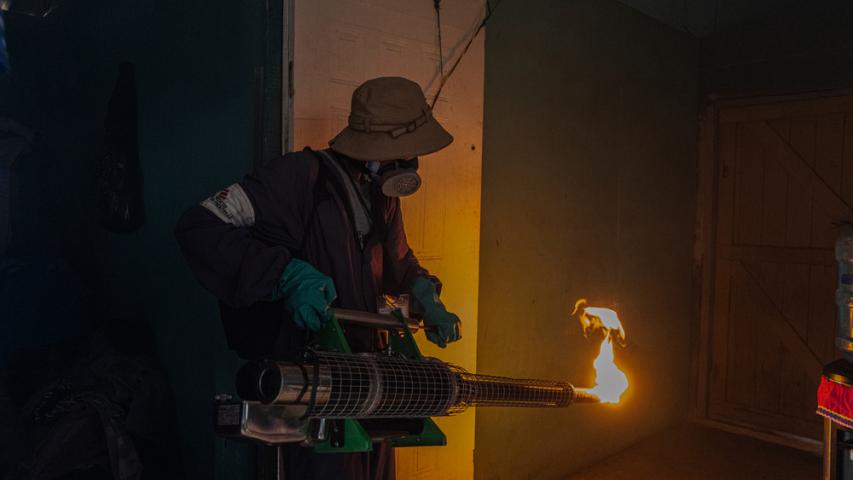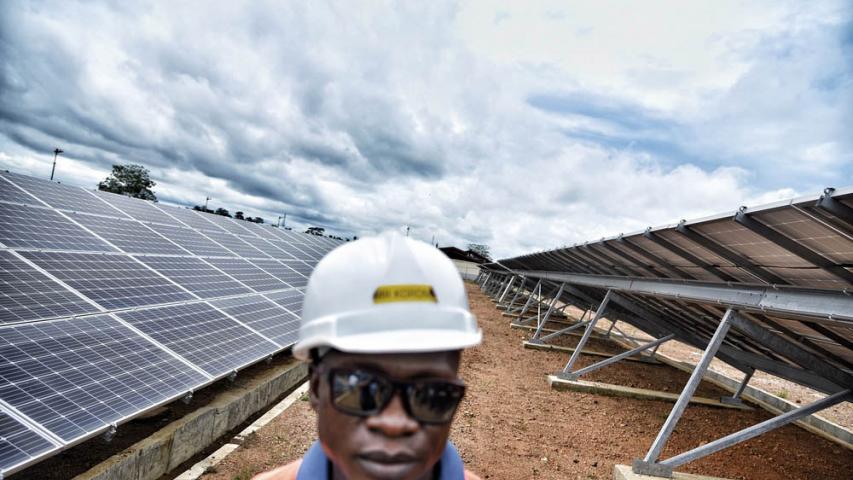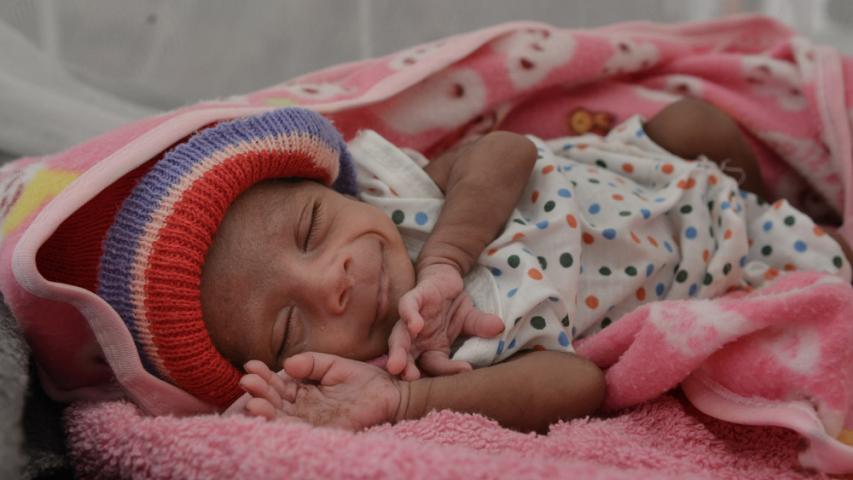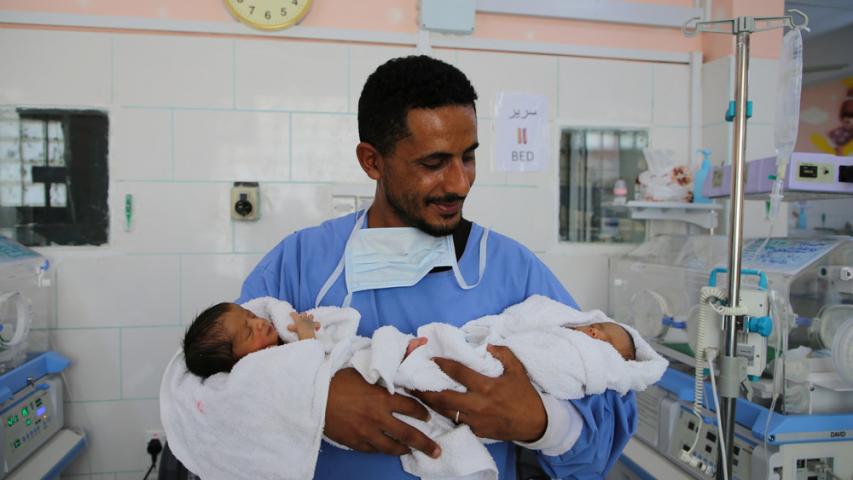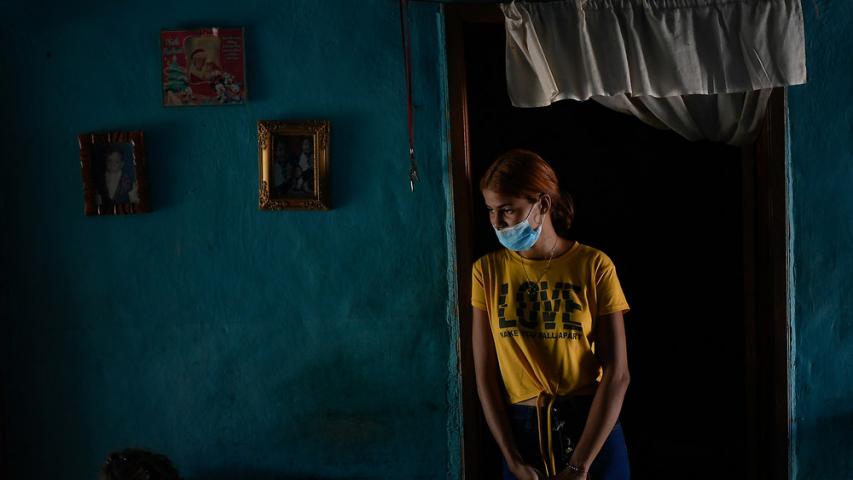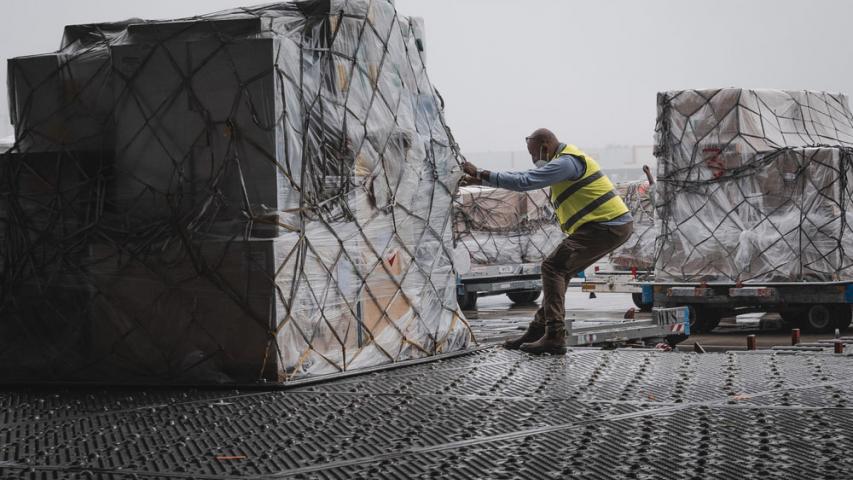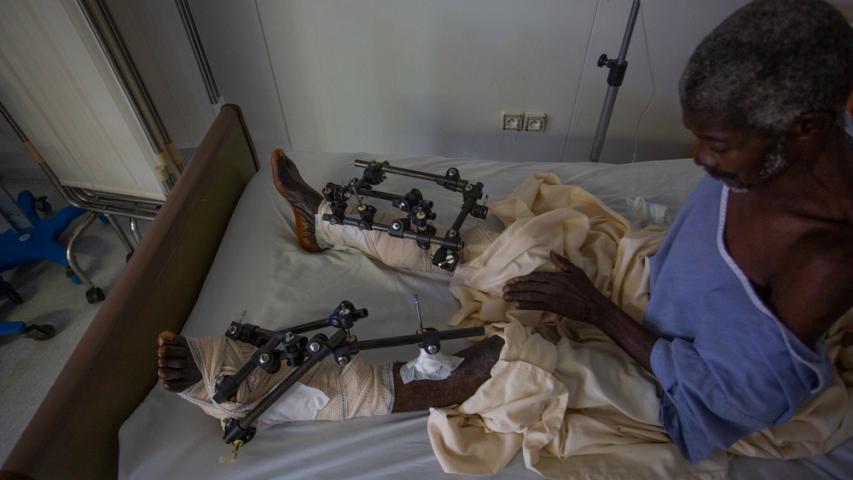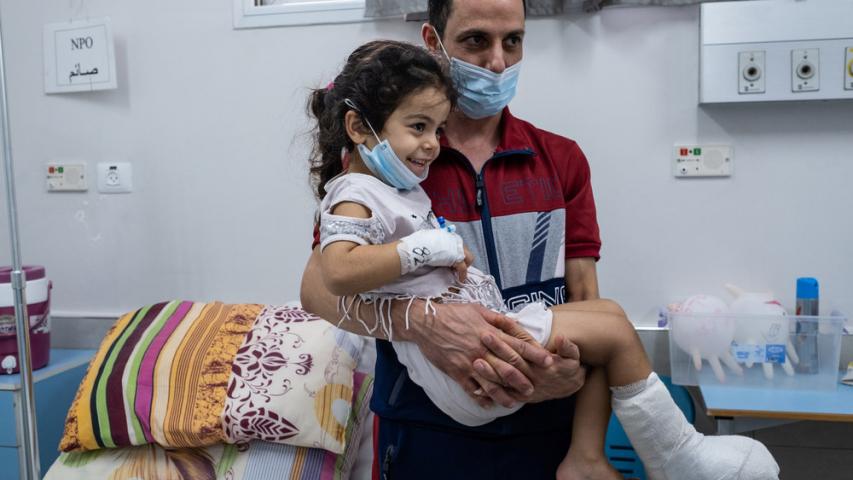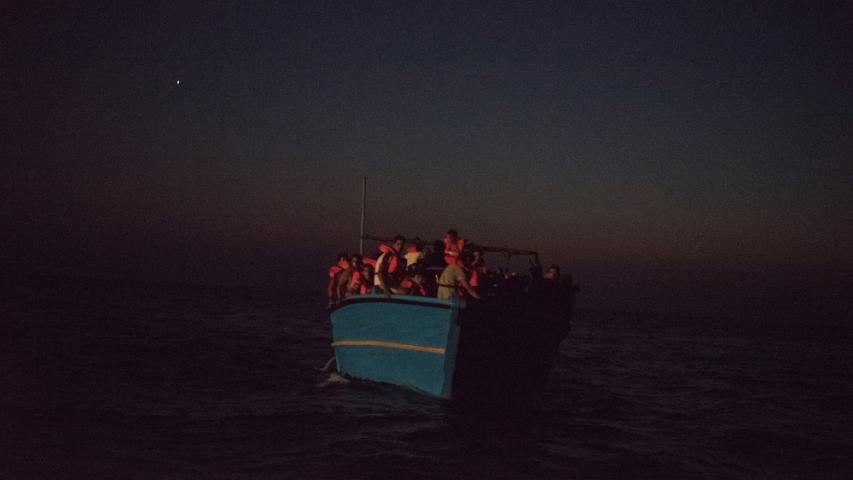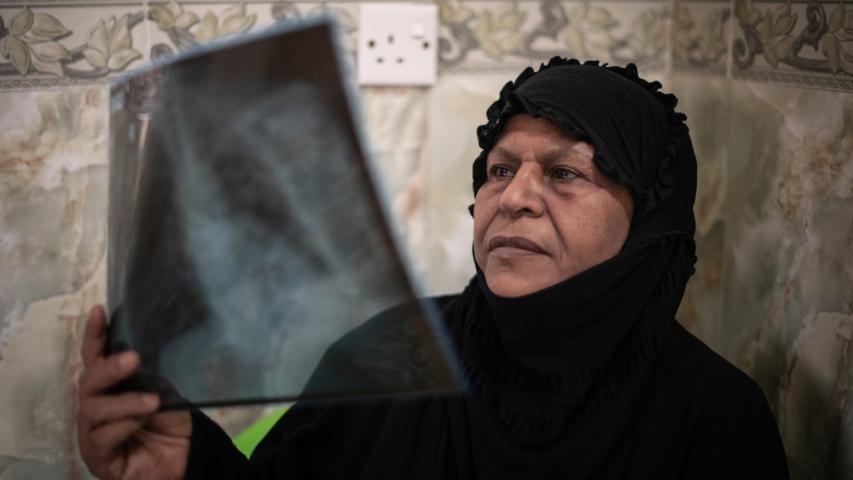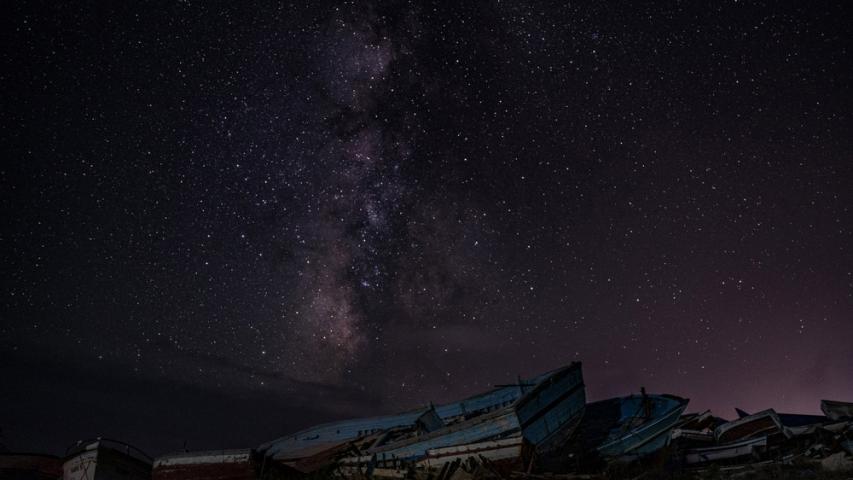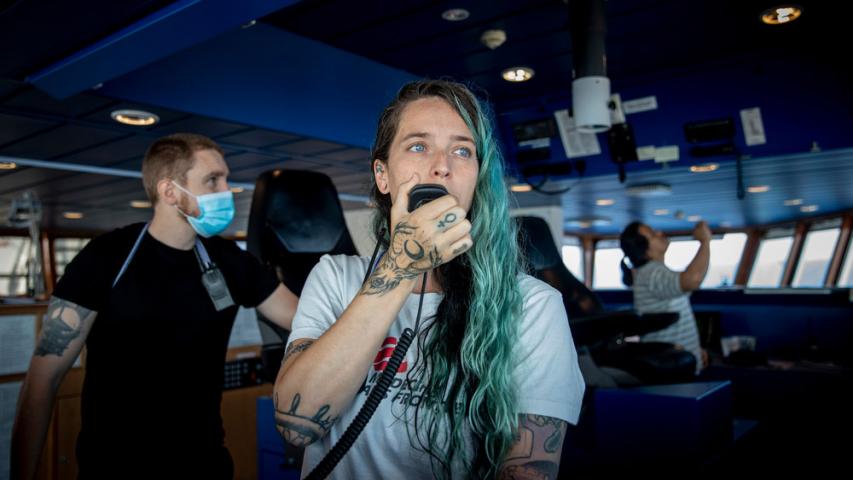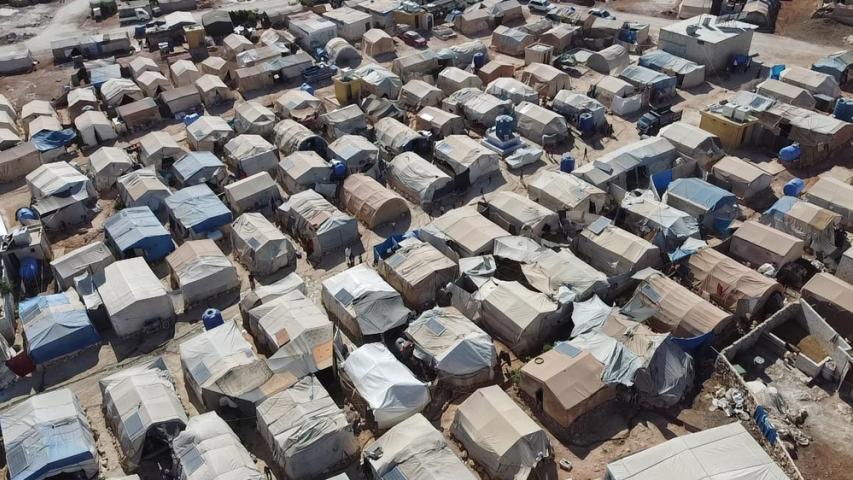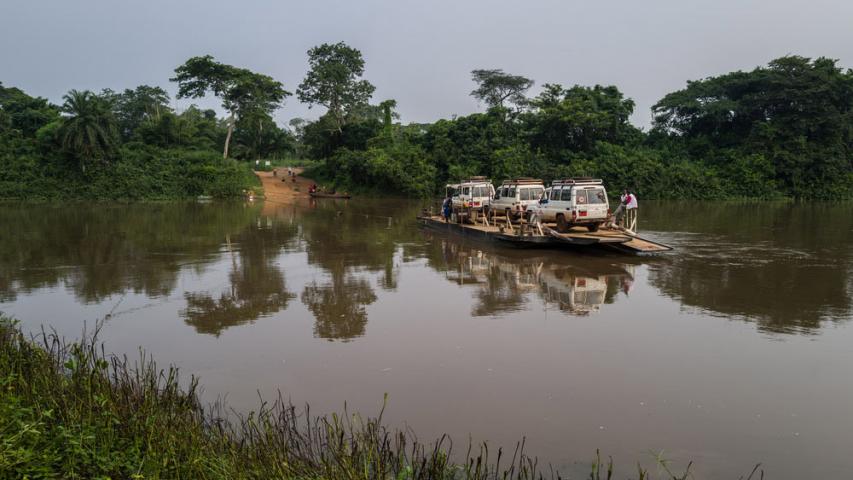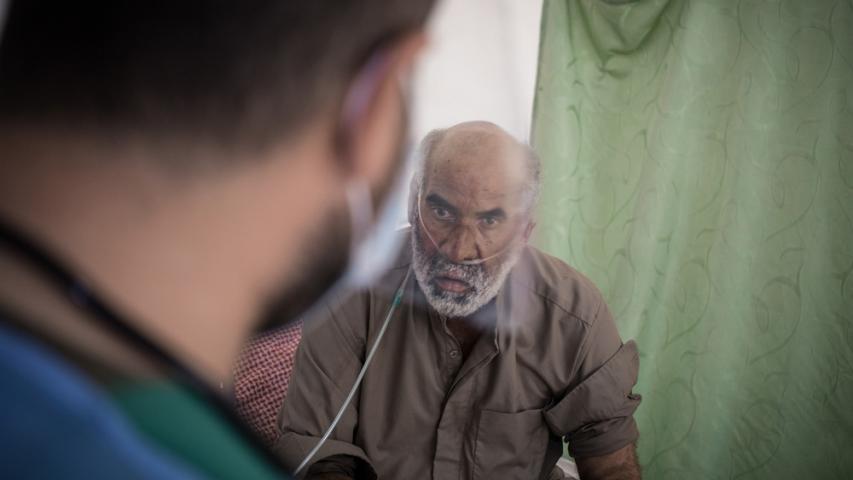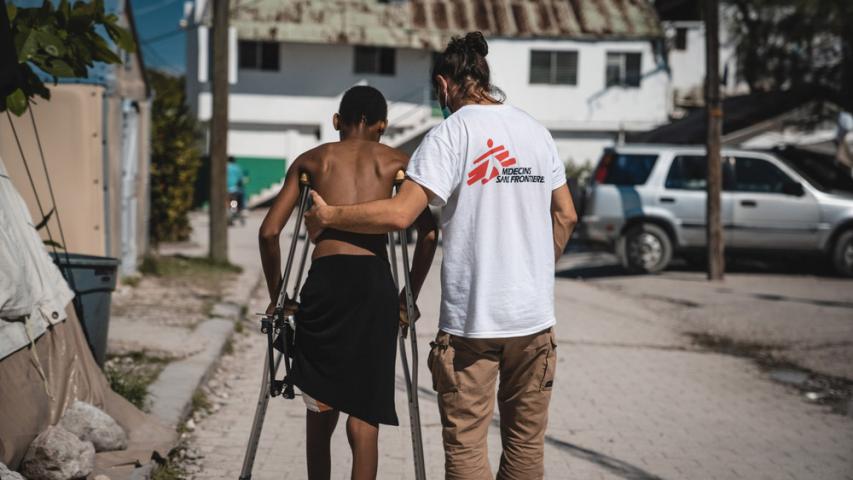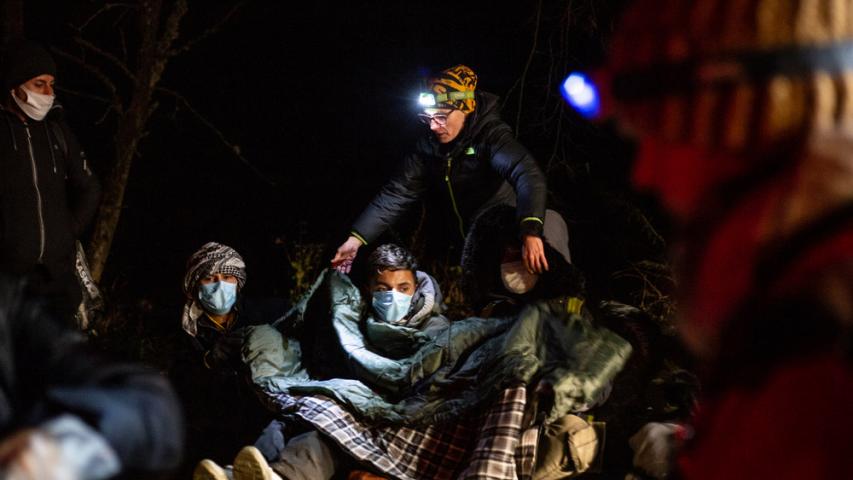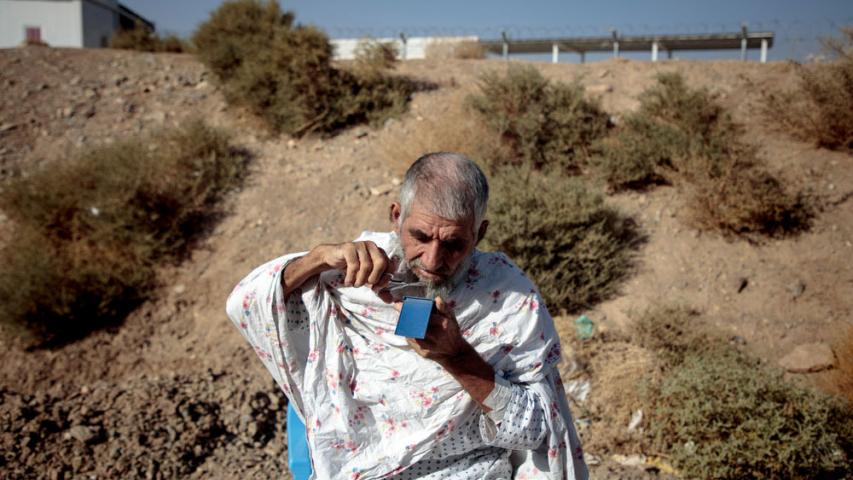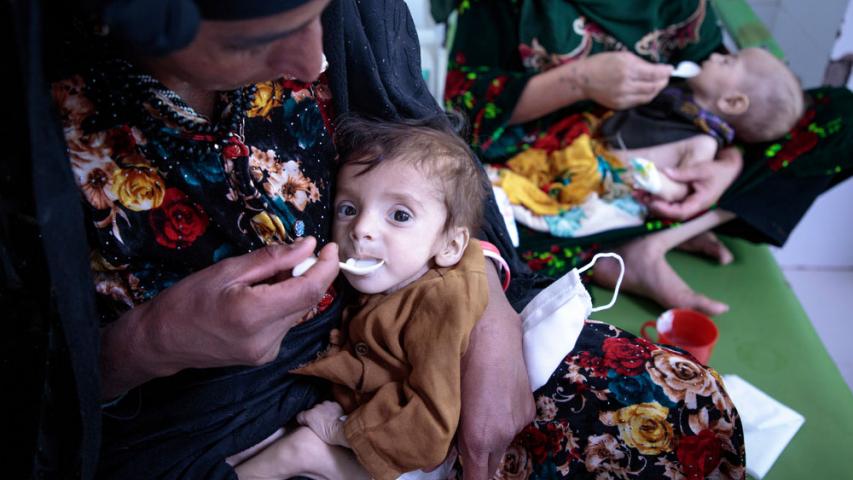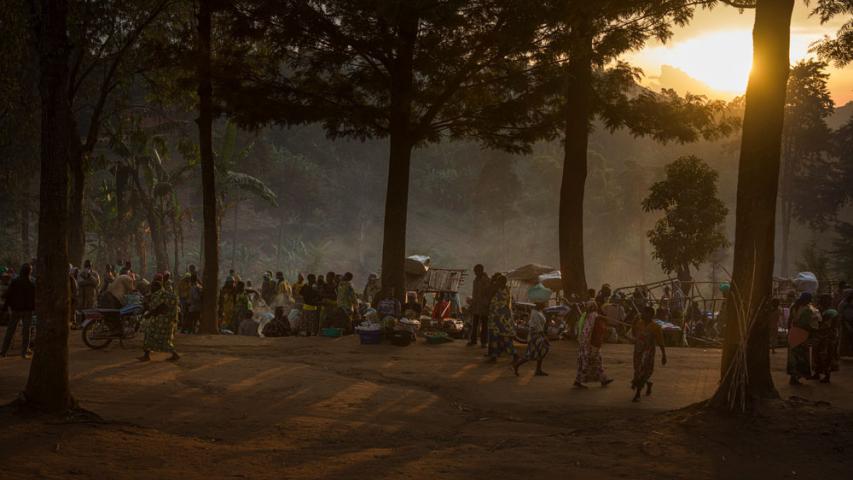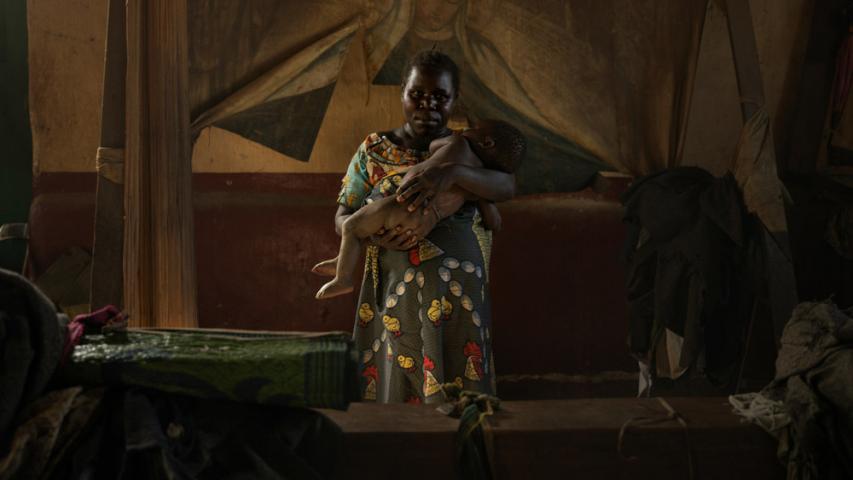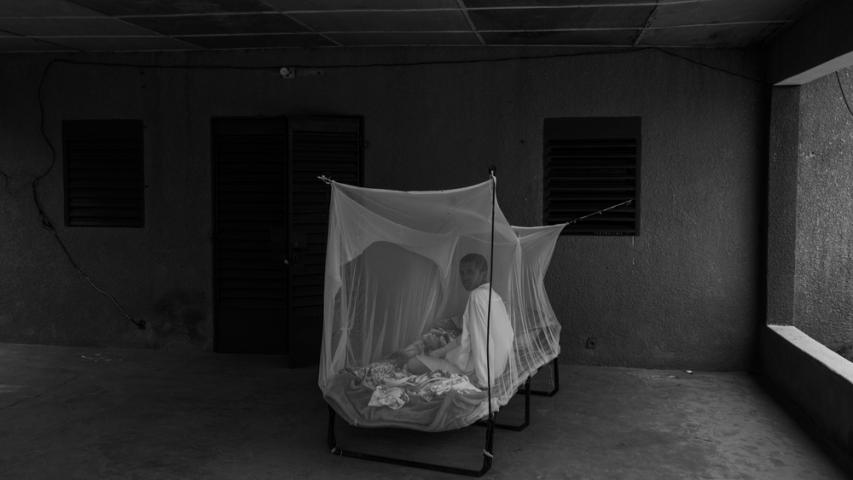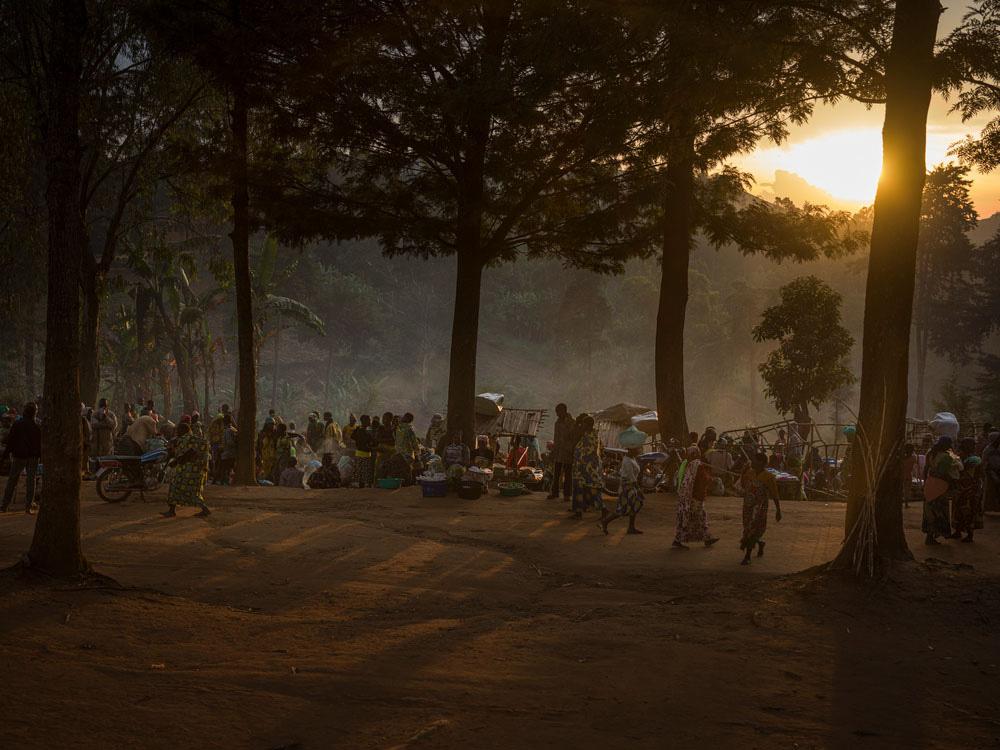
Healthcare
A year in pictures 2021
In 2021, the COVID-19 pandemic continued unabated around the world, as did the work our teams undertook to respond to it. But the pandemic took a backseat in many countries, as other crises and needs overtook the concerns of the people we assist.
Share This
Our teams responded to crises of conflict and displacement. We cared for people with malnutrition and malaria. We supported people who were subjected to sexual violence and rescued those who were in danger crossing the Mediterranean Sea. We saw the consequences of the climate emergency.
This collection of 54 images, taken between November 2020 and December 2021, was chosen from among an estimated 8,000, from among the around 75 countries we work in. In these images, staff and professional photographers from around the world have captured just some of the stories of people and patients, and our work with them, bearing witness to an essential humanitarian need – access to medical care.
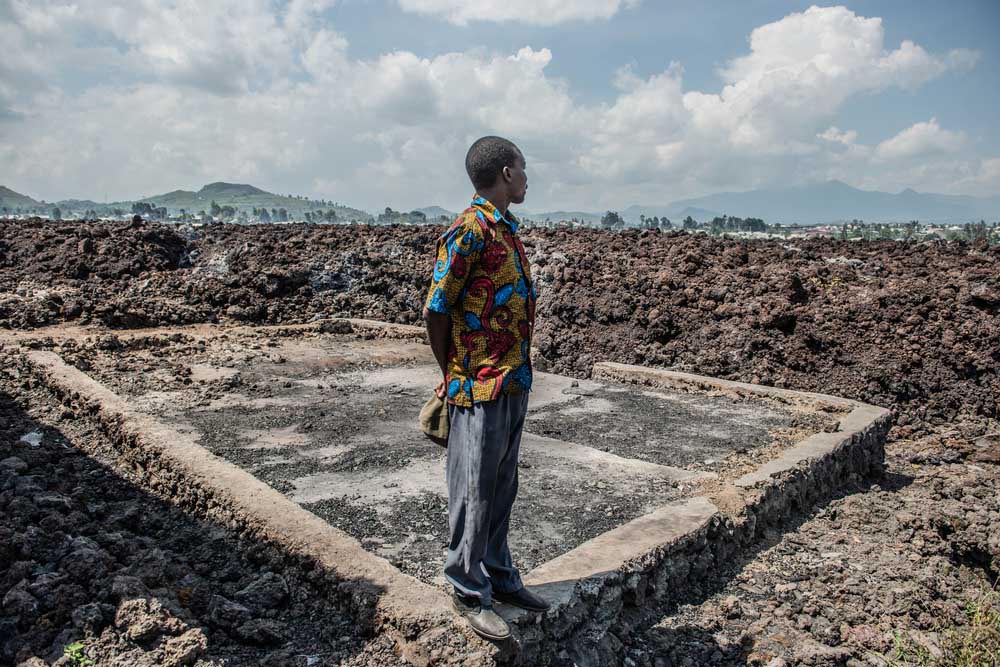
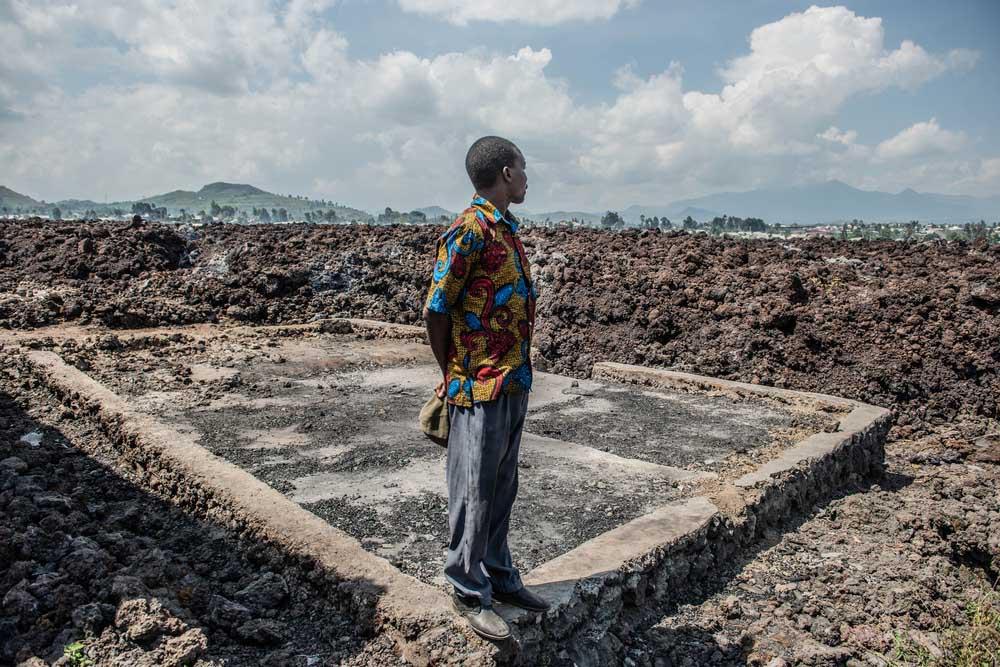
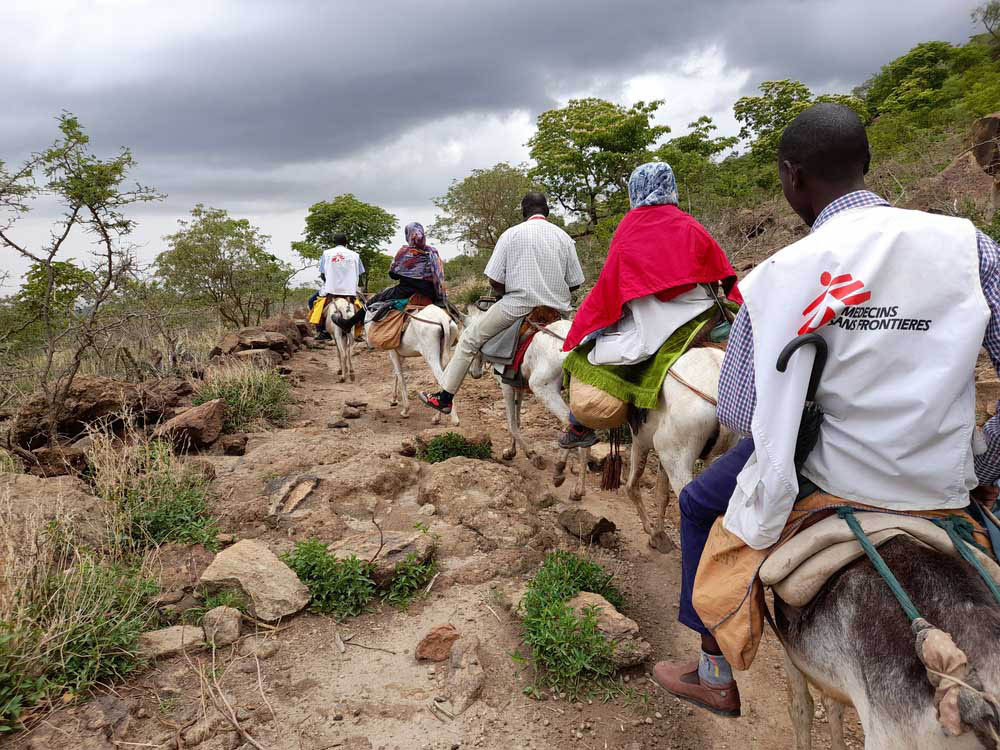
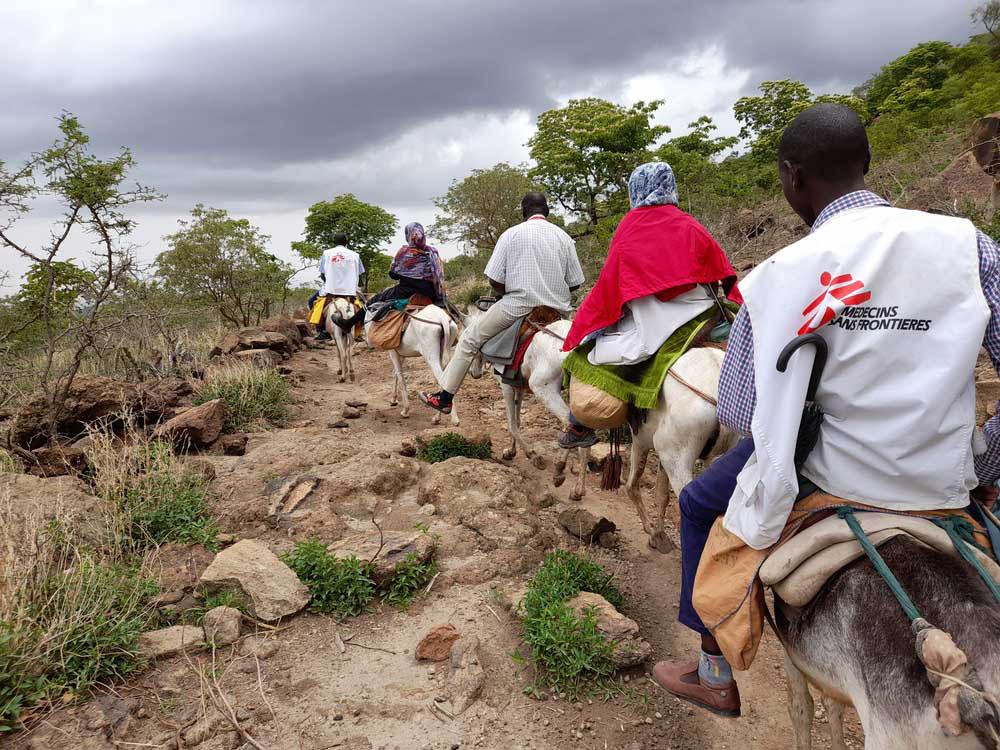
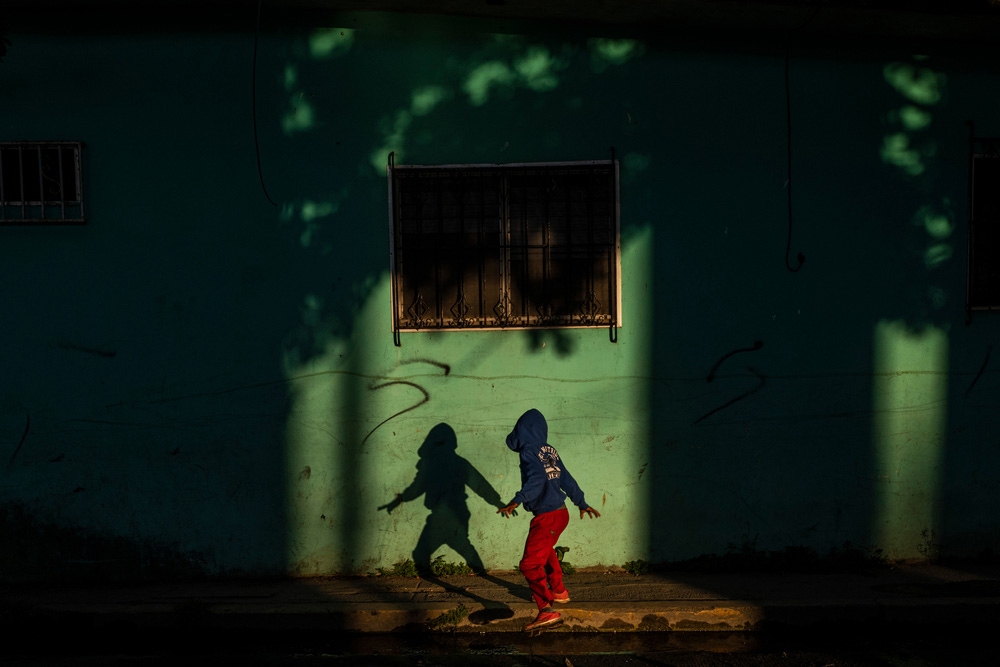
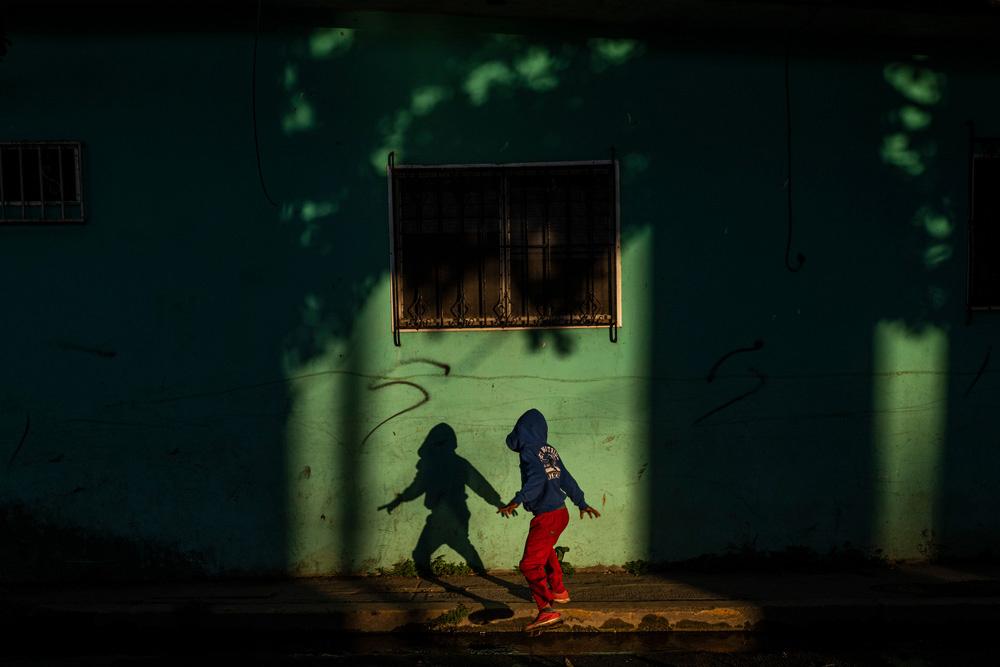
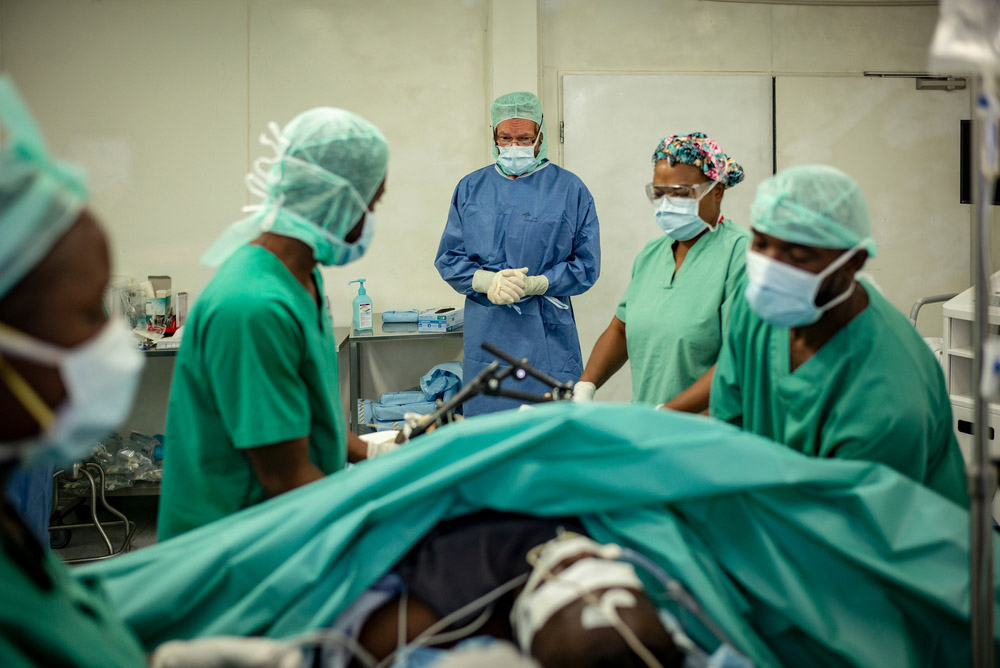
Doctors specialising in traumatology and vascular surgery amputate a patient with a leg injury. “The mortality rate we have in Tabarre is low. The quality of care is high and there are very specialized medical staff. There is no other trauma center in Port-au-Prince that gives the necessary treatment for free. We face a lot of complex surgical cases here with patients then needing hospitalization.” – Stefano Zito, MSF medical activity manager, Tabarre Hospital
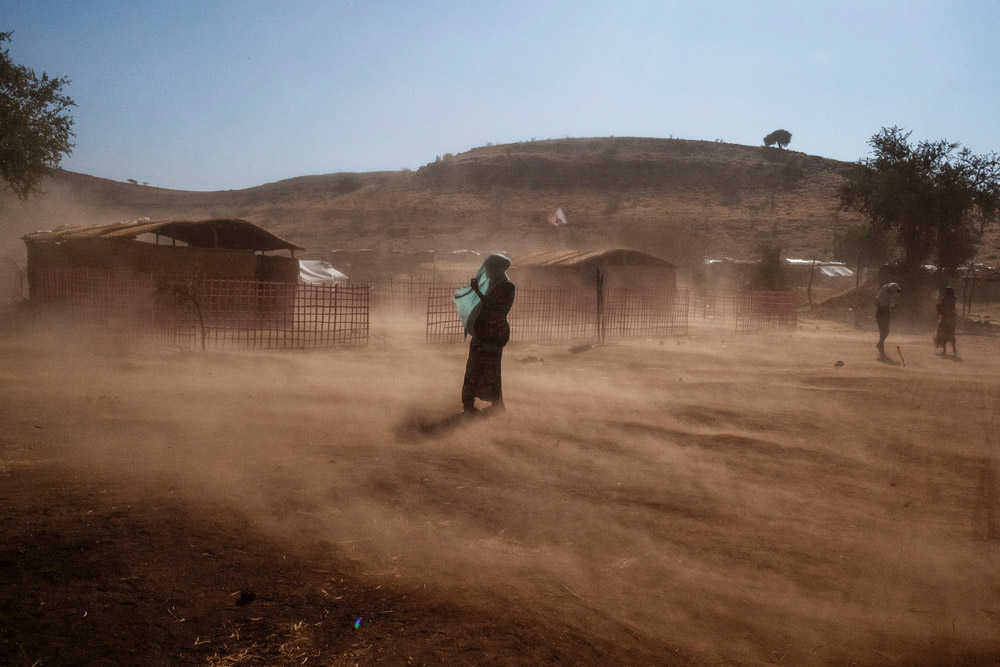
Ethnic Tigray, Ethiopian, refugees who fled the central government's military offensive against what is perceived as separatism by the Tigray regional government and its military branch TPLF. When crossing into Sudan the refugees are transferred and settled in Um Rakuba, which was already a site of camps during the 1984 famine. Our teams run the water supplies and has an emergency clinic in the camp.
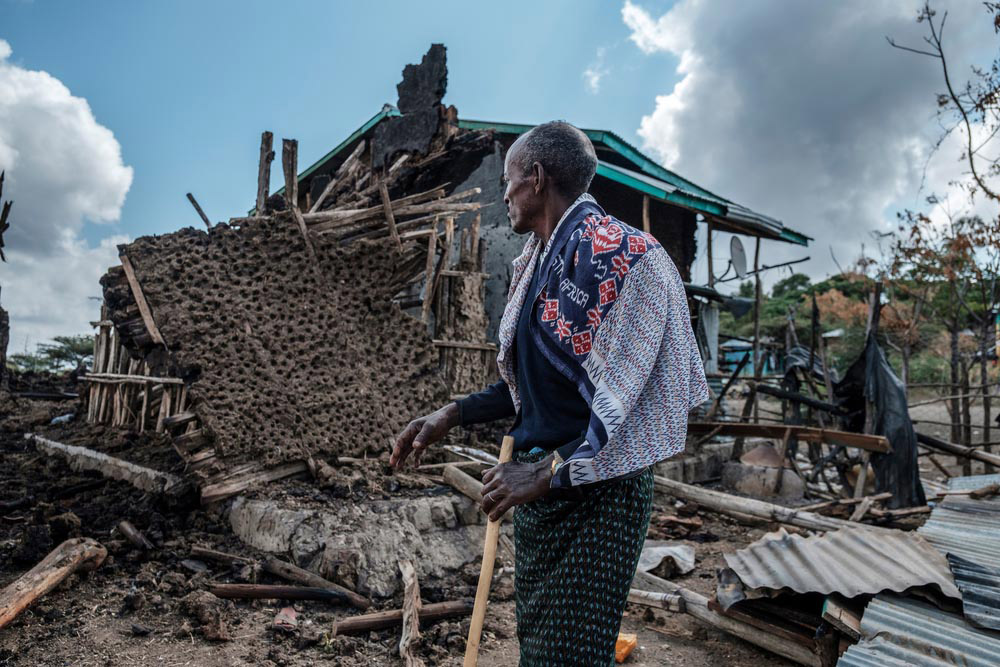
A man stands in front of his destroyed house in the village of Bisober, Ethiopia, on December 9, 2020.
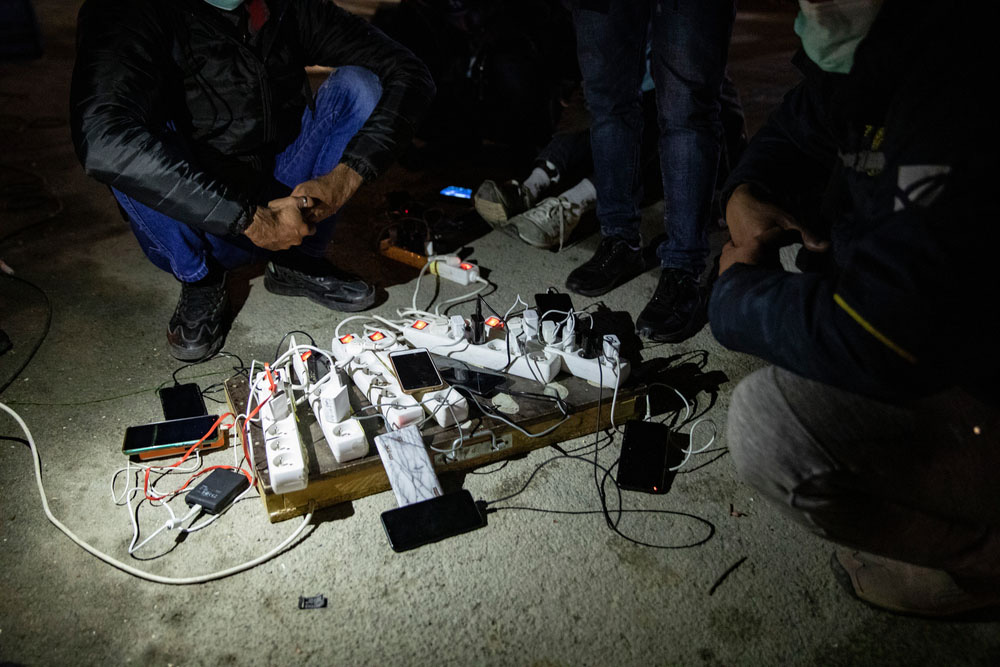
The “Talità Kum” refuge, located opposite Oulx railway station. The shelter is open from 6 pm to 10 am and it is managed by a network of volunteers.
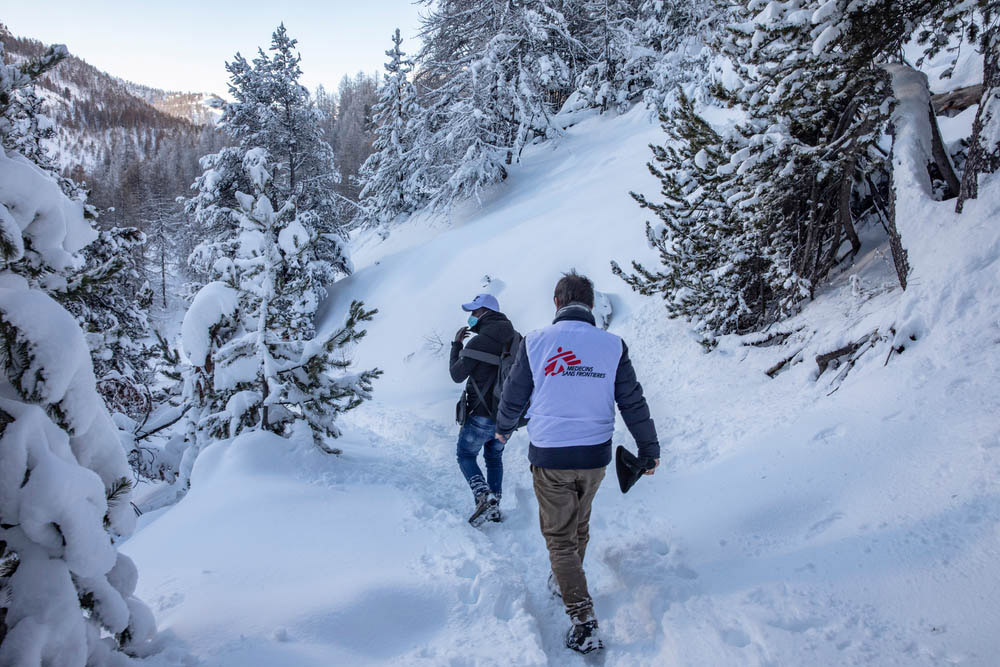
Even in winter, people head westwards across the snow-capped mountains towards France; many tell stories of being repeatedly turned back by the French police.
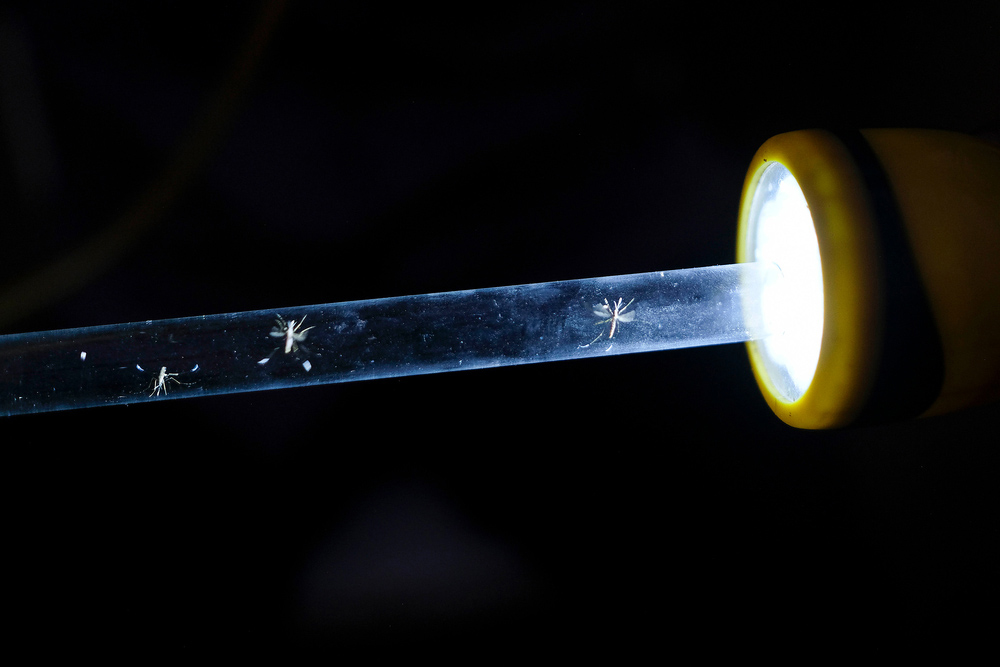
Anopheles mosquitoes have been captured to study them. The analysis of malaria transmitters supports the design of effective vector control strategies. MSF teams work with local authorities to prevent malaria in communities in Sucre state, northeastern Venezuela.
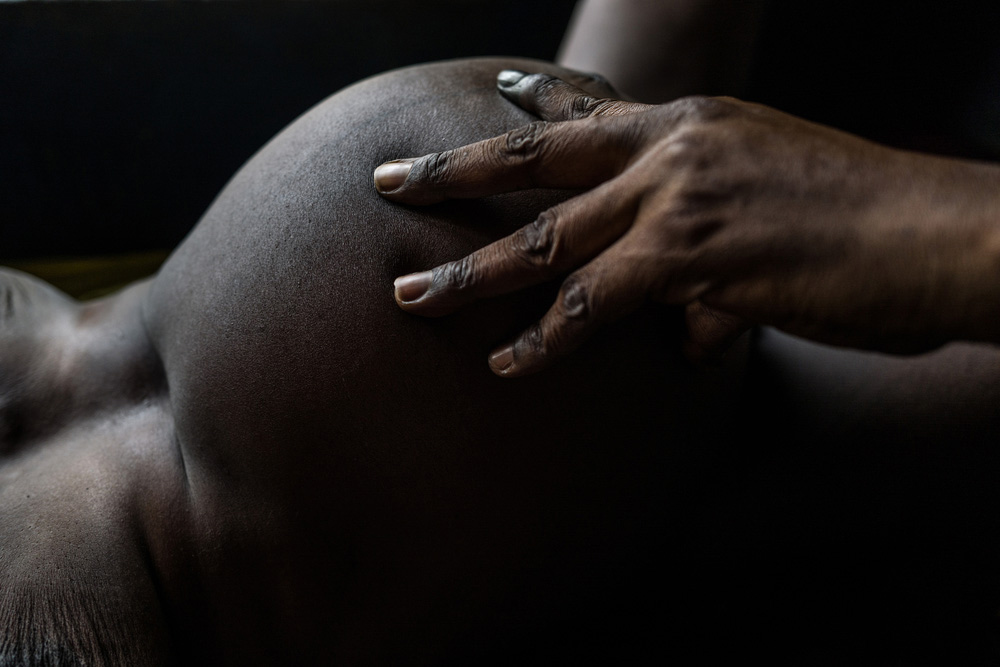
Octavie Braza takes 5 hours to deliver and finally, at 17.30h a baby boy comes out alive despite all the complications and lack of material at Nzacko health centre.
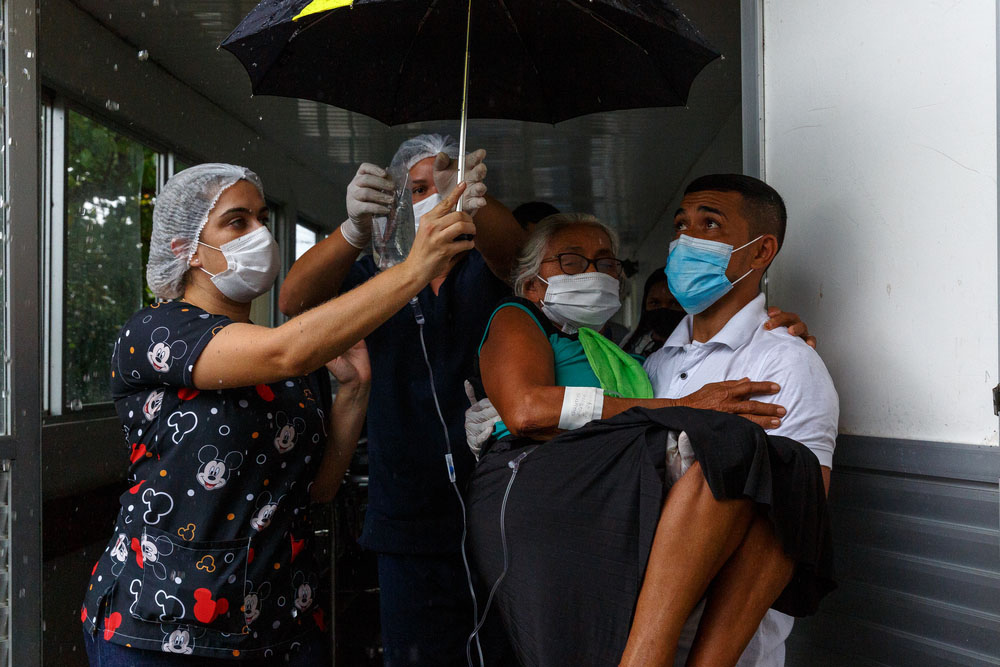
Patient is carried to the ambulance shortly after the start of a heavy rain in Tefé. She will go to the airport and from there to the state capital, Manaus, where there are more resources for her treatment of COVID-19. The transfer of this patient took place in late December 2020, before the health system in Manaus collapsed for the second time and referrals to the state capital were interrupted.
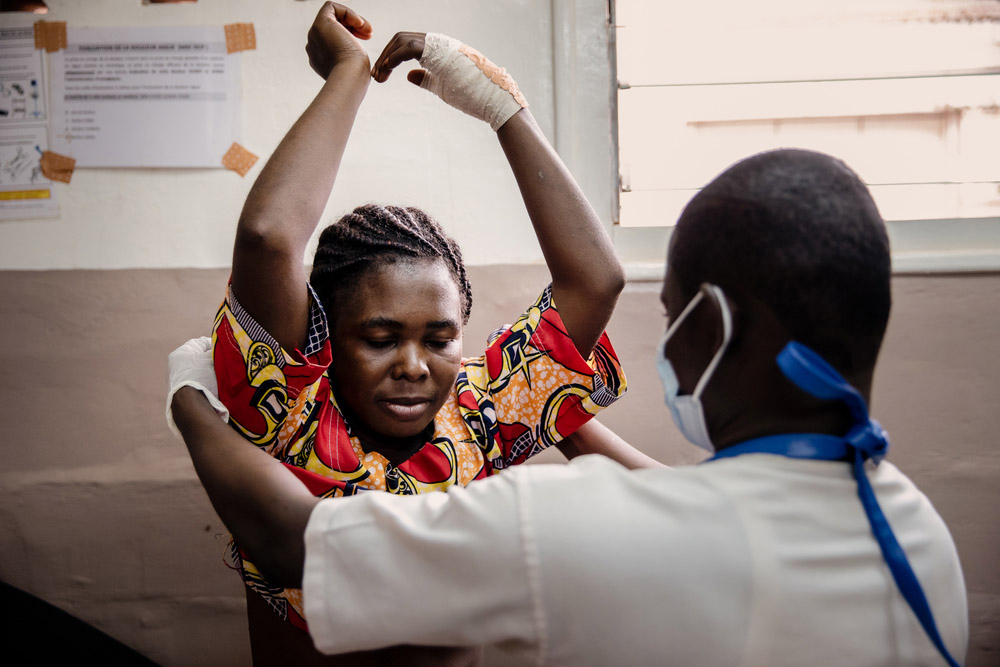
MSF medical staff helps France undress to check her chest wound and change her dressings, at the MSF’s SICA Hospital, on 2nd February 2021, in Bangui. France Beldo, 31, was wounded by a stray bullet on 13 January 2021 attack in the outskirts of Bangui, Central African Republic.
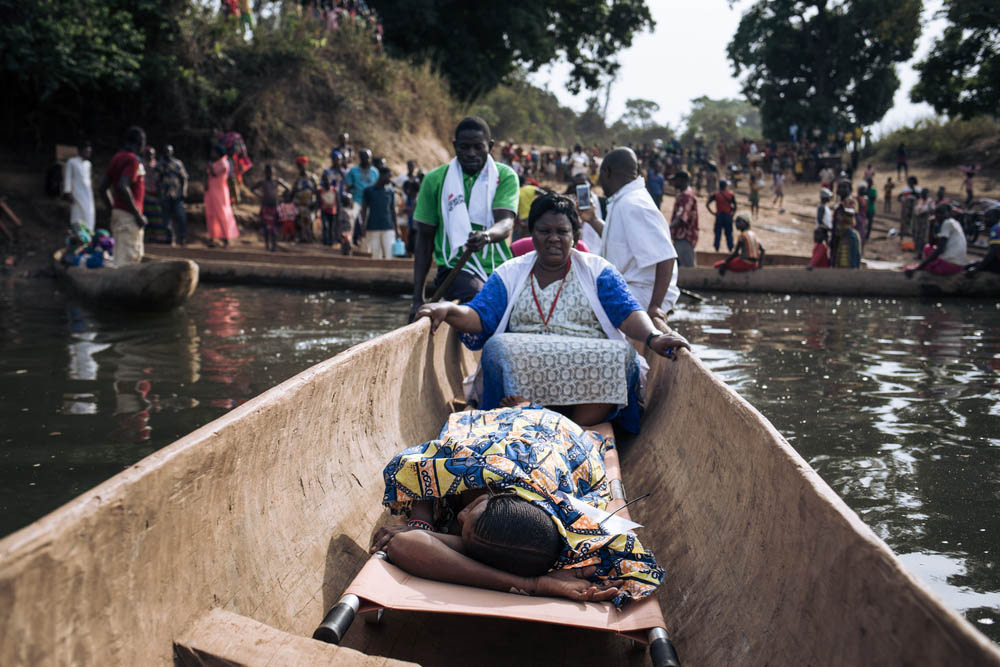
Amatou (lying down in the pirogue), 25 , has been a refugee in Ndu, Democratic Republic of the Congo, since the violent events of 2017 that occurred in Bangassou. She is pregnant and about to give birth but the midwives in the MSF-supported Ndu health centre identified some complications (hemorrhage) that cannot be managed from the health centre. Amatou is therefore referenced to the MSF-supported hospital in Bangassou, on the other side of the river, where she can be operated, if needed. Amatou is brought here by Odette, a midwife working in the small health center in Ndu, DRC. Facing the town of Bangassou, on the other side of the Mbomou river, the village has been hosting CAR refugees for years following spikes of violence.
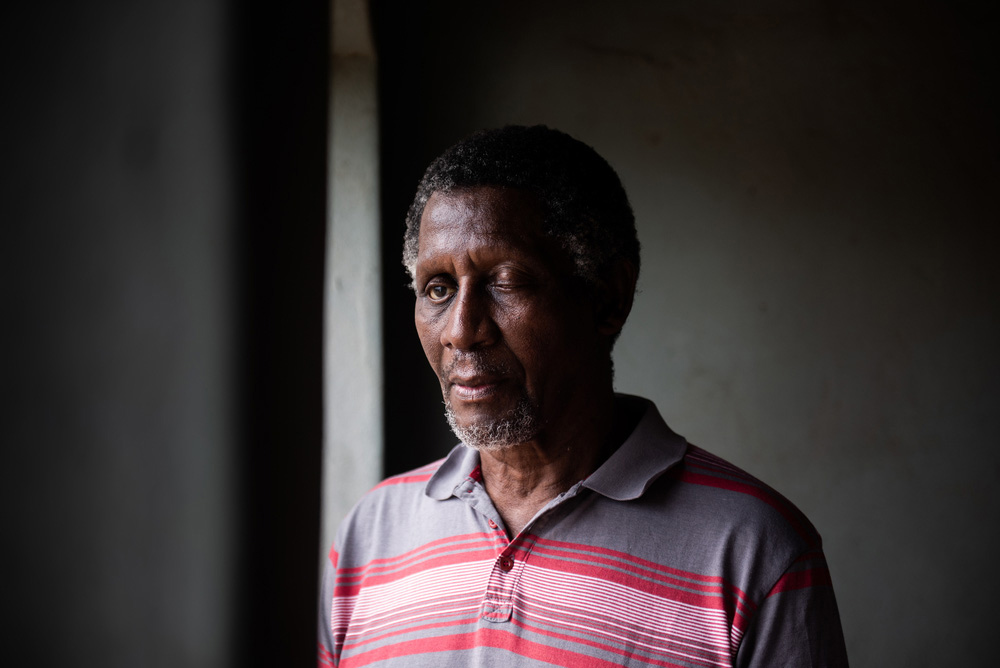
Josias Madela was taking a shower in early January, when he unexpectedly experienced faintness and fell. Family members rushed him to hospital, where he was admitted, and tested for COVID-19. After his results came back positive he was transferred to the field hospital, where he says he was treated well. “I did not have the strength to do basic things, but nobody shouted at me.” He particularly appreciated the fact that his family were kept well informed. “I am blind, they could have worried but from the start they were reassured, and this made me feel I had nothing to fear,” he says.
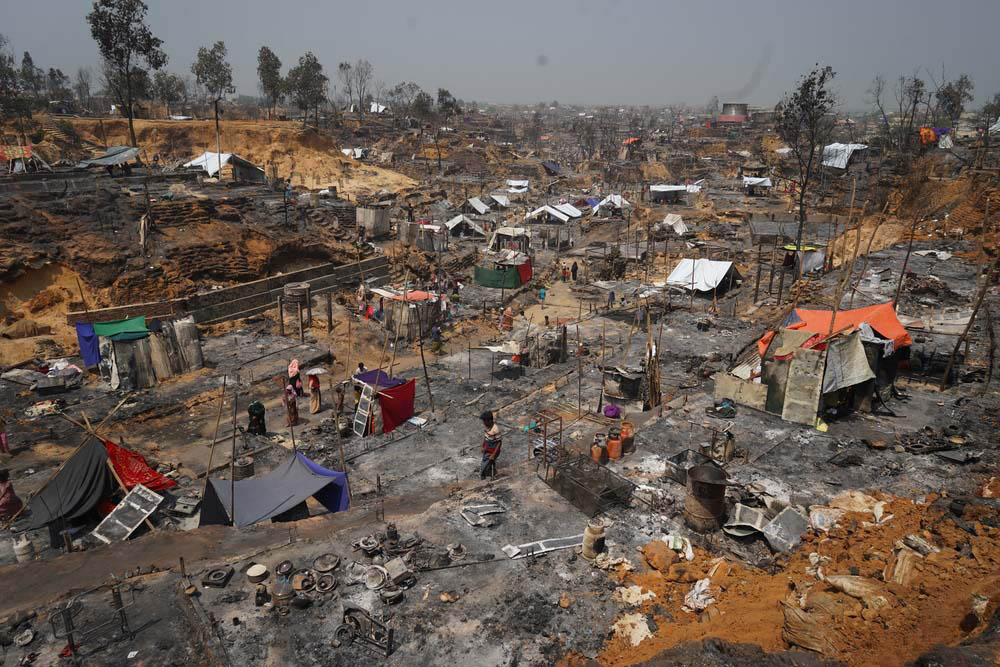
Fire destroyed thousands of shelters in several of the camps for Rohingya refugees. There are currently around 860,000 Rohingya refugees in Bangladesh and living conditions for them deteriorating due to several factors, including COVID-19 measures.
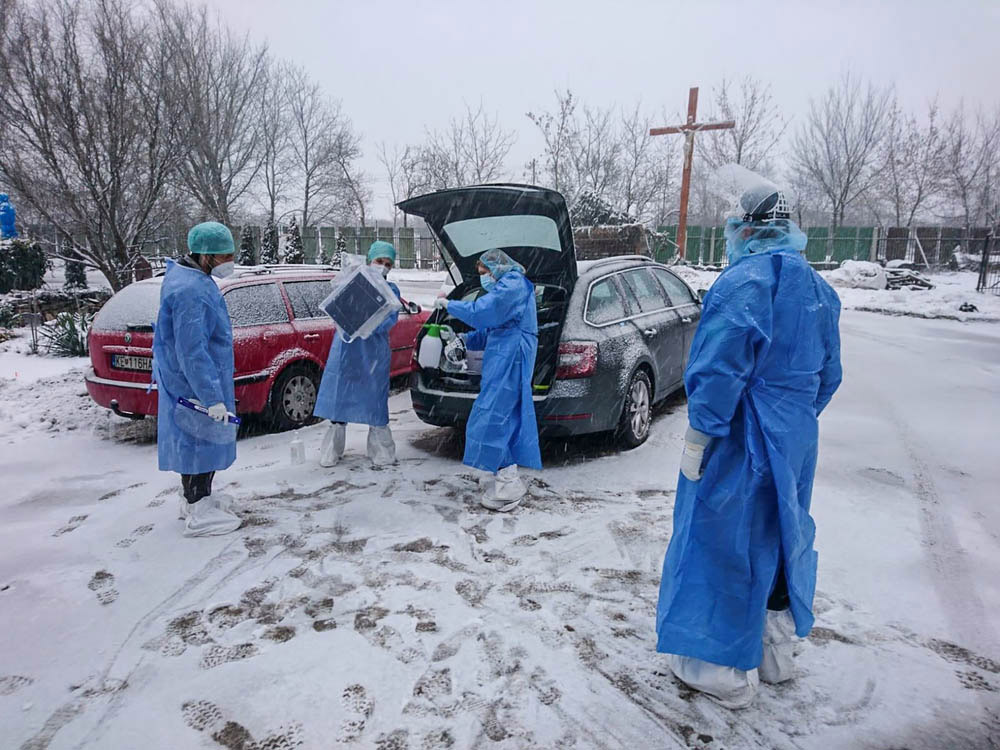
The MSF mobile team includes medical and non-medical profiles (Logistics, Administrators, Coordinators) and focuses on two pillars: (1) medical support and IPC trainings to nursing homes facing a high number of COVID-19 cases (2) medical support, mental health trainings, and health promotion trainings in Roma settlements.
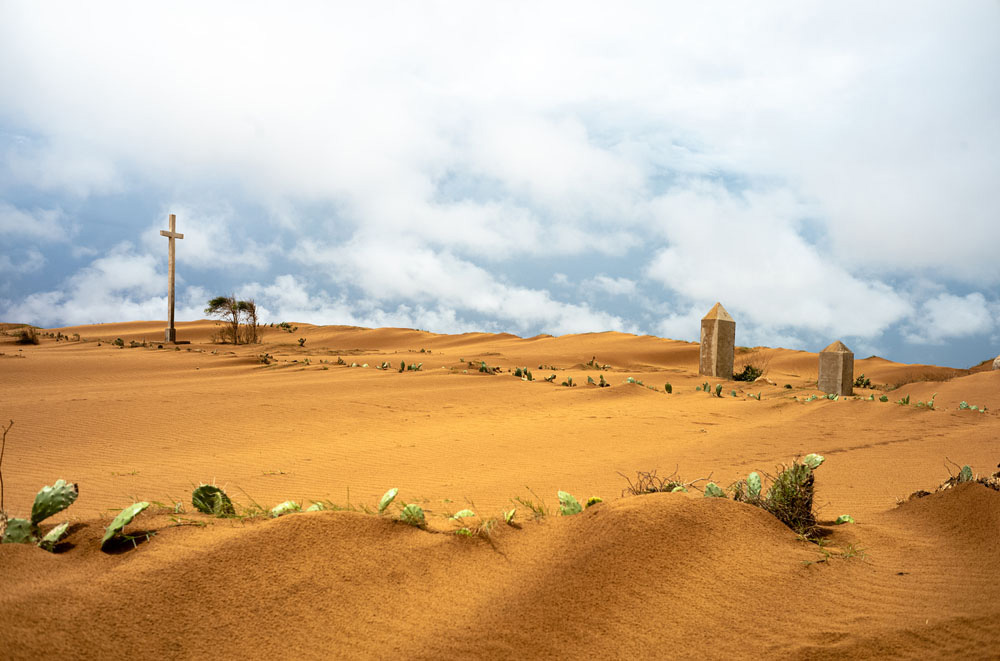
Formerly lined with cacti, the roads and paths are now buried under the sand. The food hunger season, which usually ends in April, is becoming more critical each year in the desert regions of southern Madagascar. Three consecutive years of drought have severely affected harvests and access to food, in a context now marked by the Covid-19 pandemic, which has led to a drop in seasonal employment and other sources of income. From December onwards, violent sand winds also covered part of the arable land and food used during the lean season, such as cactus fruit. As a result, the chronic food and nutrition crisis, known on the island as kéré, is hitting the inhabitants even harder.
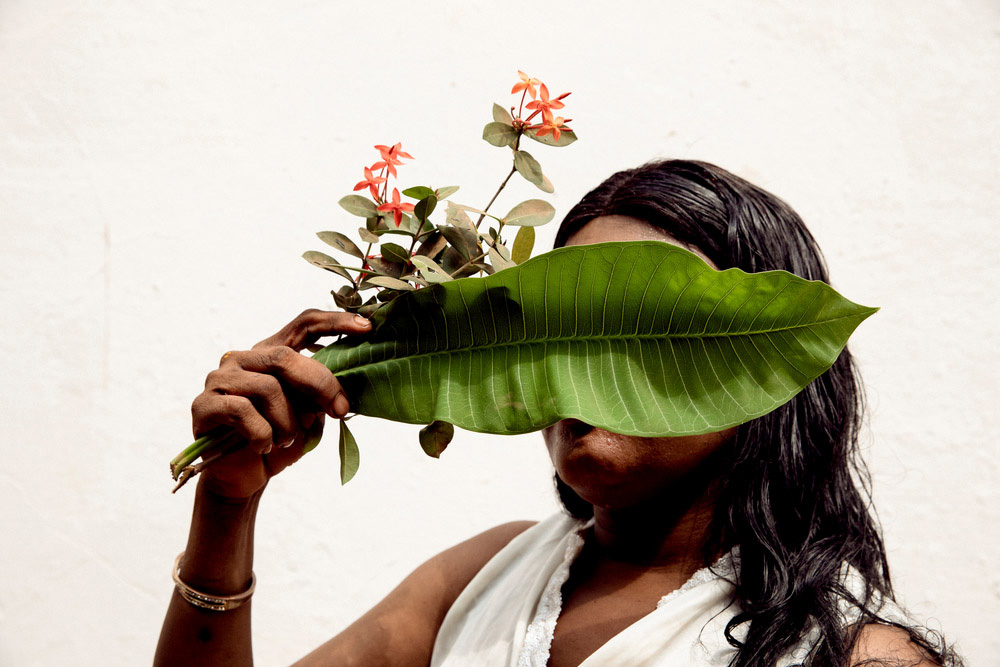
Nanette’s association, National Association for the Support of Free Women and Girls (ANAP) does social and economic reinsertion for survivors, as well as offers psycho-social support and eases the reference to MSF’s Tongolo centre. Compiling the testimonies and files of the survivors, Nanette also follows their cases with the Human Rights and justice organisations active in the Central African Republic.
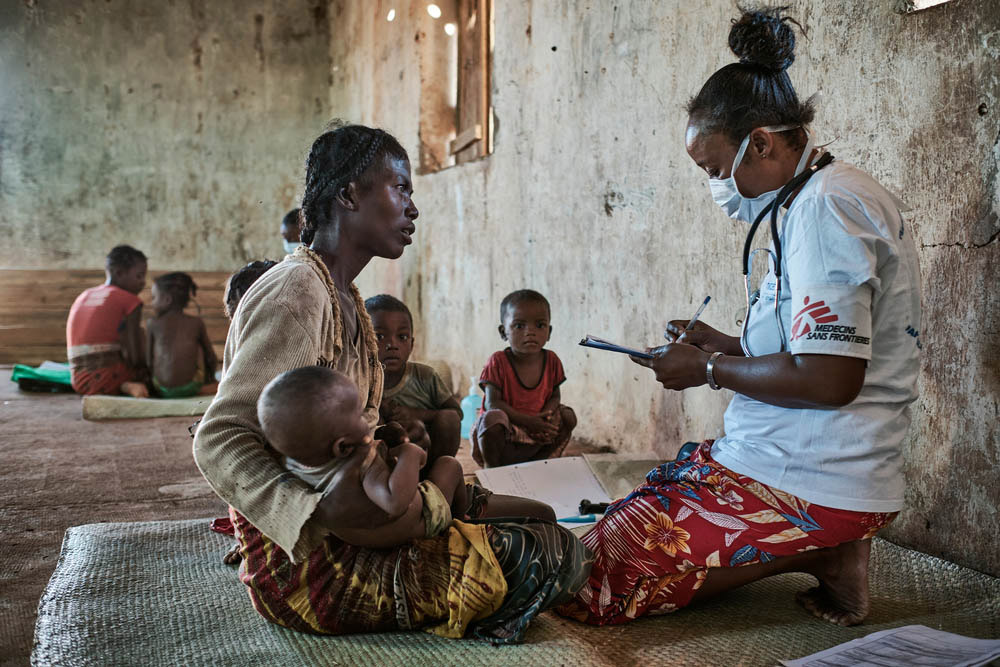
42-year old Vitasoa has six children. She’s brought four of them to the Médecins Sans Frontières mobile clinic. All the children are included in the nutrition programme launched at the end of March to respond to the food and nutrition emergency in southern Madagascar. “We live in Fenoarivo, and it took us five hours to walk here from Ranobe. During the rainy season, we live off cassava, mangoes and edible leaves. But, nothing’s growing because there’s been no rain. We make do with manioc tubers we find in the forest, cactus fruit and edible leaves. We have to dig in the sand for water as there’s also less surface water. Every day we pray for rain. We’re staying positive, but we really hope it’ll come soon.”
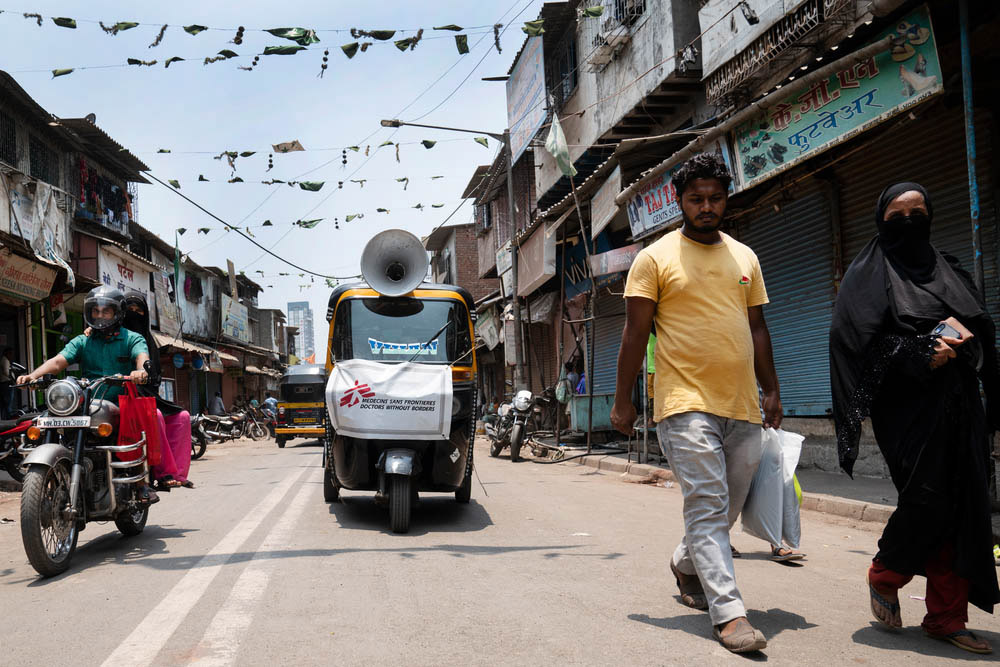
An Auto-Rikshaw (tuktuk) visiting alley lanes of Mumbai’s M-East Ward slums to generate COVID-19 Awareness
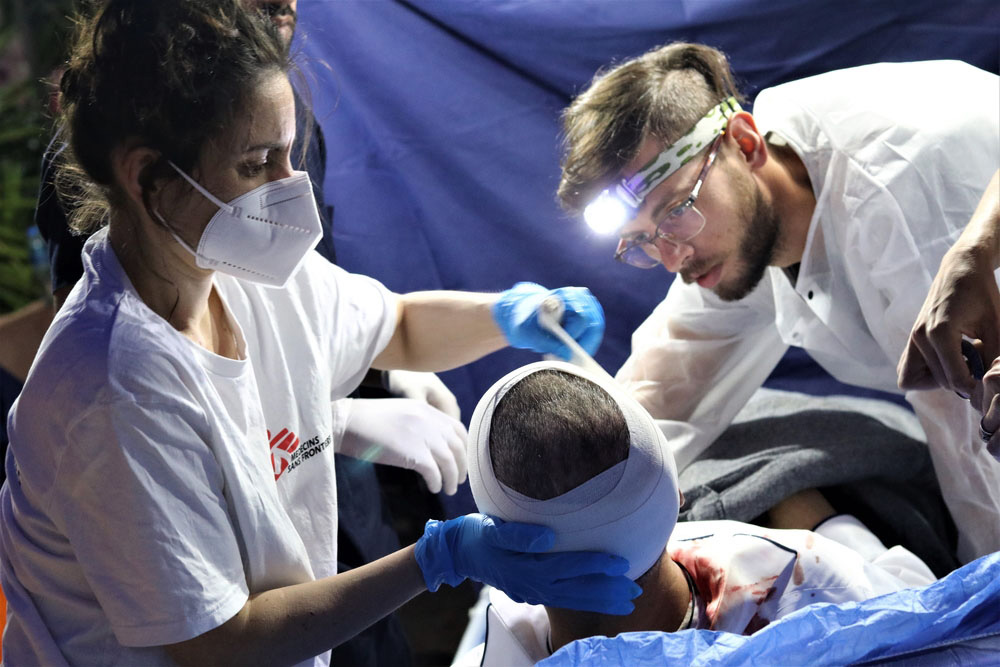
On Monday 10th of May, 2021 Doctors Without Borders (MSF) started supporting the Palestinian Red Crescent Society (PRCS) in Jerusalem to assess and stabilize hundreds of Palestinians injured by the Israeli police.
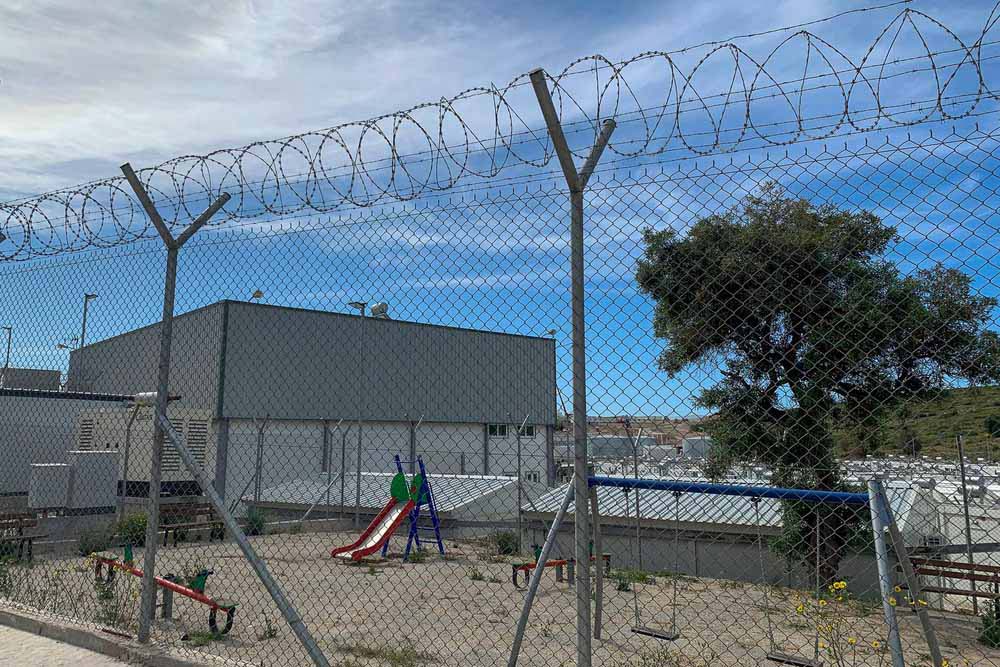
A brand-new reception centre, just 5km away from Vathy city, is being built in Samos island. Located in the middle of nowhere, it is designed to host up to 3,000 people, of which according to the Greek Minister of Migration, 2,100 will have a “controlled access” and 900 will be in detention waiting to be sent back to Turkey. Patients and people who live in Vathy reception center describe it as an open-air prison.
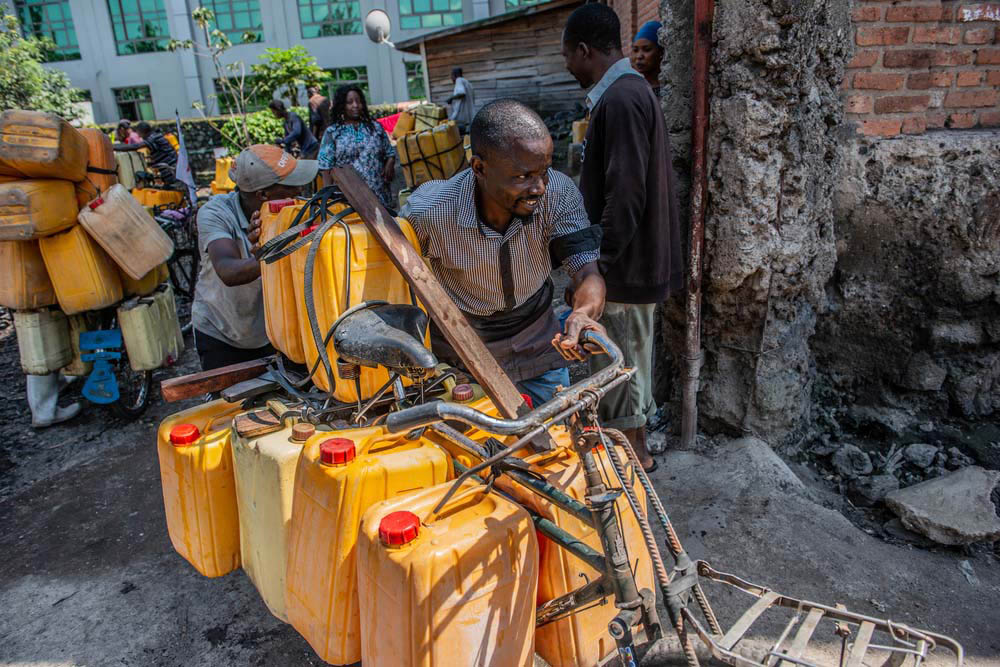
Since the eruption of the Nyiragongo volcano on May 22, water has become a scarce commodity. There is no question of leaving families without water: I have seven children, I understand their difficulty. In return, they pay me to provide food for my family. I cannot take advantage of the current crisis situation to make money and double the price of my services. The price has not changed: 250 Congolese Francs (0.10 euros) for a jerrycan of 20 liters of water. Sometimes I have to ask for up to 300 FC (0.14 euros) if I had trouble getting supplies. To avoid causing further suffering to the population or making them sick, we do not sell water from the lake but that from the tap.
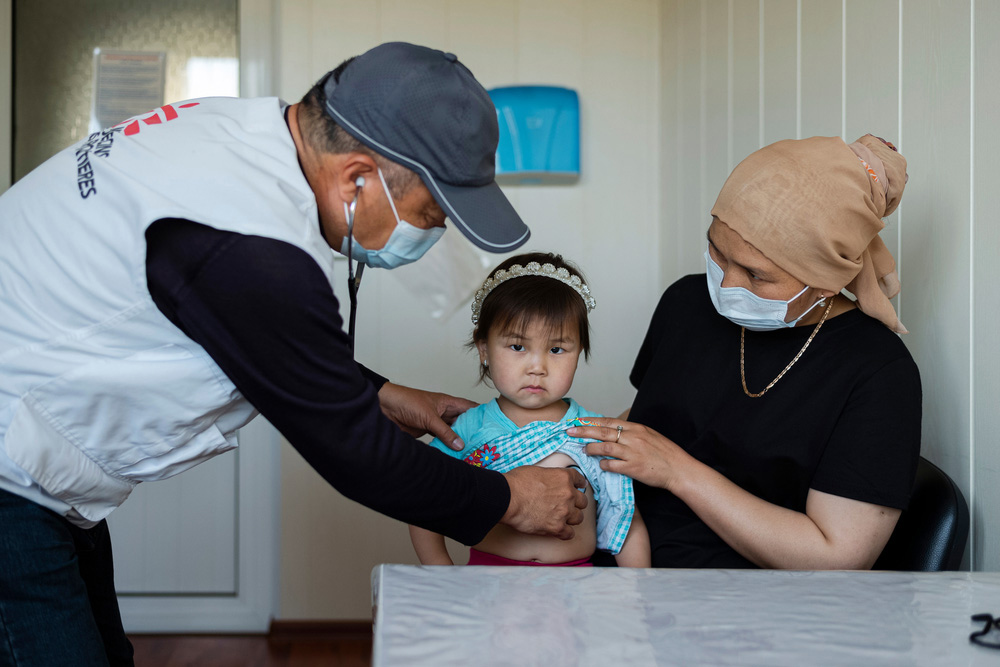
Anapiya, from neighboring village Kok-Terek, brought her daughter for consultation at Kok-Tash family medical center. Doctor Ergeshev Abdulamid is giving medical check. Kok-Tash, Batken Oblast, Kyrgyzstan.
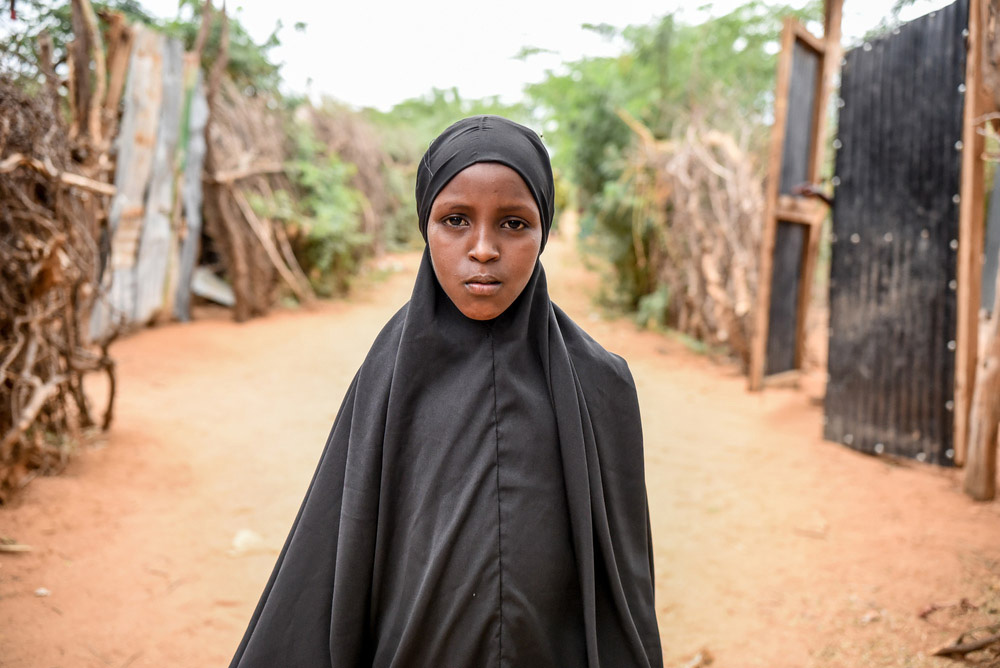
Ten-year-old Habiba lives with Type 1 Diabetes and needs to inject insulin twice every day. She was taught by MSF to inject herself and carries her insulin home, storing it in a portable cooler.
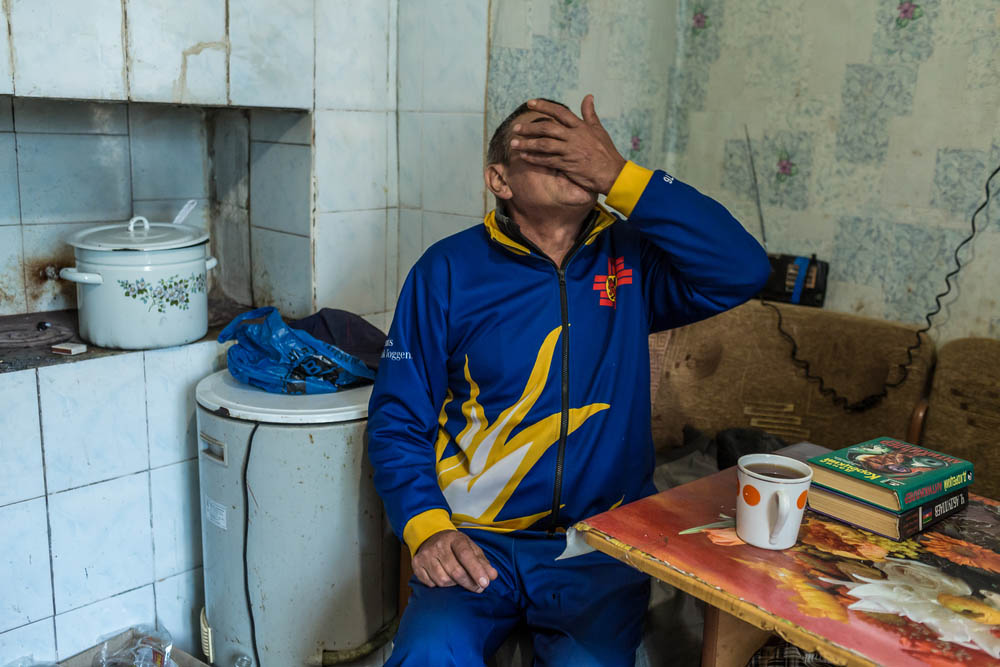
MSF nurse Oleksandr Oleksandr Vovkogon observes Vitalii Gorbachov, 56, take his DR-TB pills at this home in Chudniv village, Zhytomyr region, Ukraine. In order to enhance patient autonomy, MSF’s programme offers a combination of directly-observed (DOT), video-observed (VOT) and self-administered (SAT) therapies, depending on the needs and capacity of the patients. In directly-observed and video-observed therapies, a trained health worker observes patients swallow prescribed drugs, either in person or through video-enabled smartphones.
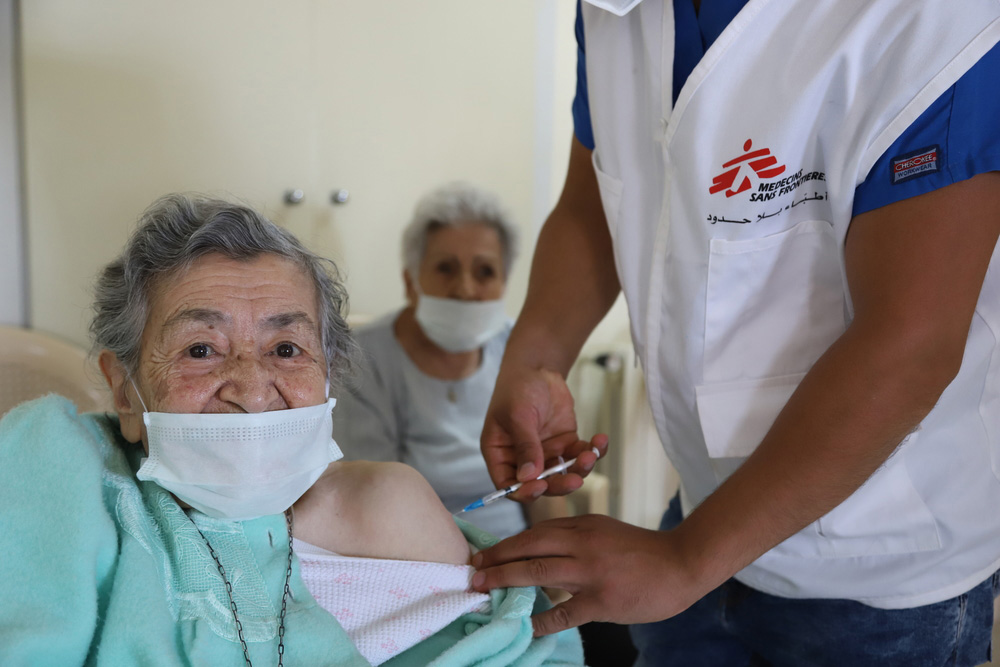
An elderly woman is being vaccinated against COVID-19 by a member of MSF’s mobile vaccination team at a nursing home in Shayle (Mount Lebanon).
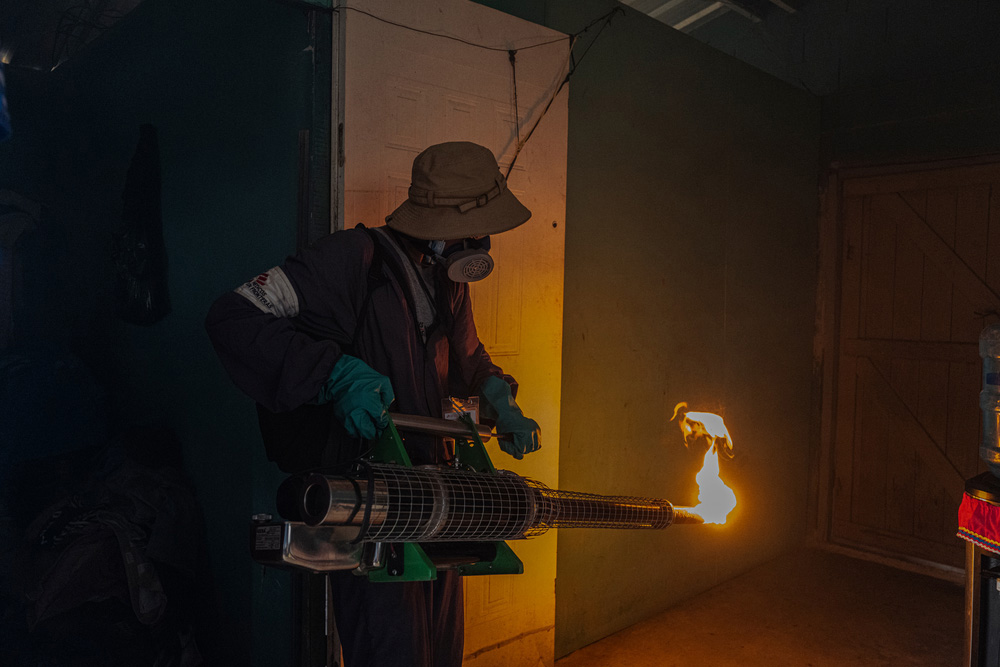
The MSF team spraying for pest control, Colonia Juan Orlando Hernandez. Coloma, Honduras April 7, 2021.
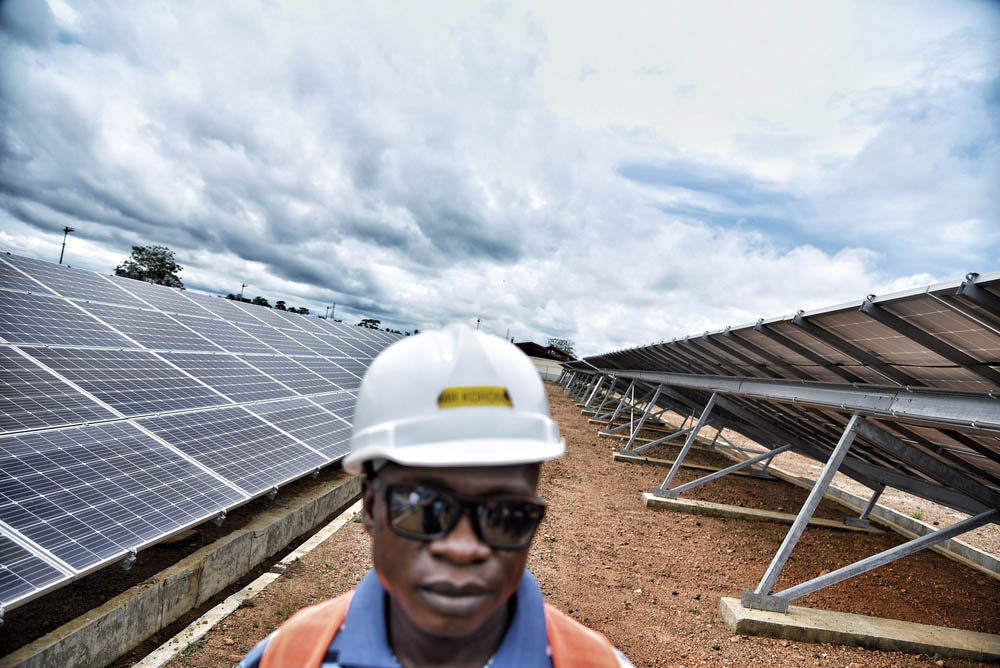
MSF logistics supervisor Mohammed Korma stands amid the solar panels that MSF has installed in Kenema district. MSF is aiming to run the Hangha hospital fully with clean energy in the future.
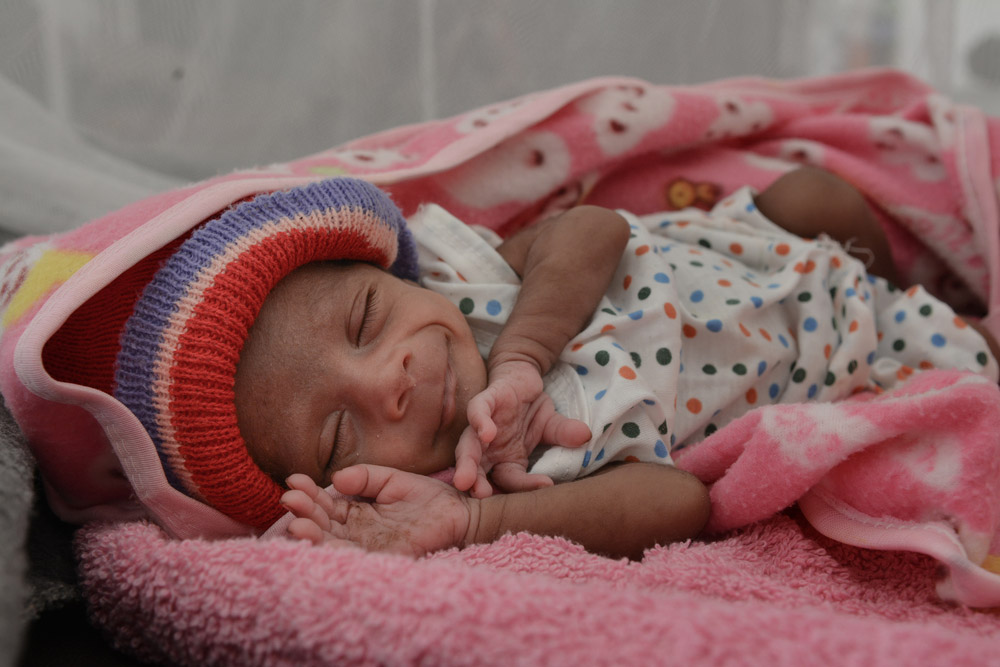
Baby Dawit Yonas was born prematurely, weighing only 1.2 kg. His mother, Mebruit Muruts, gave birth to Dawit at MSF’s maternity clinic in Al-Tanideba camp.
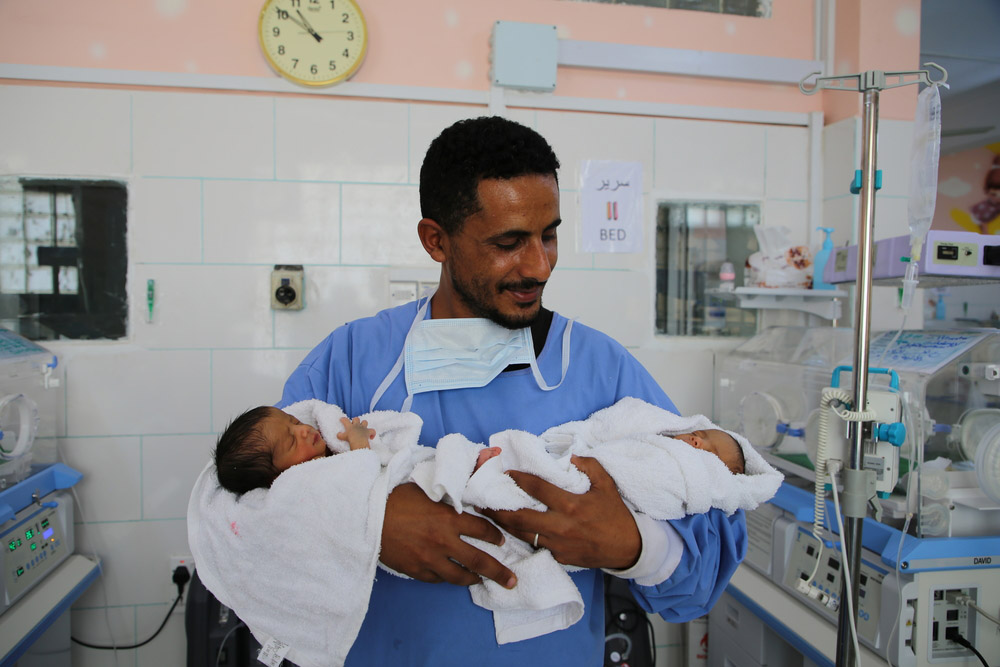
A happy father, Wael Abdul Jabbar Mahyub, lovingly holding his twin daughters Heba and Malath who are under treatment at special care baby unit supported by MSF at Al Jamhouri hospital in Taiz City, Yemen.
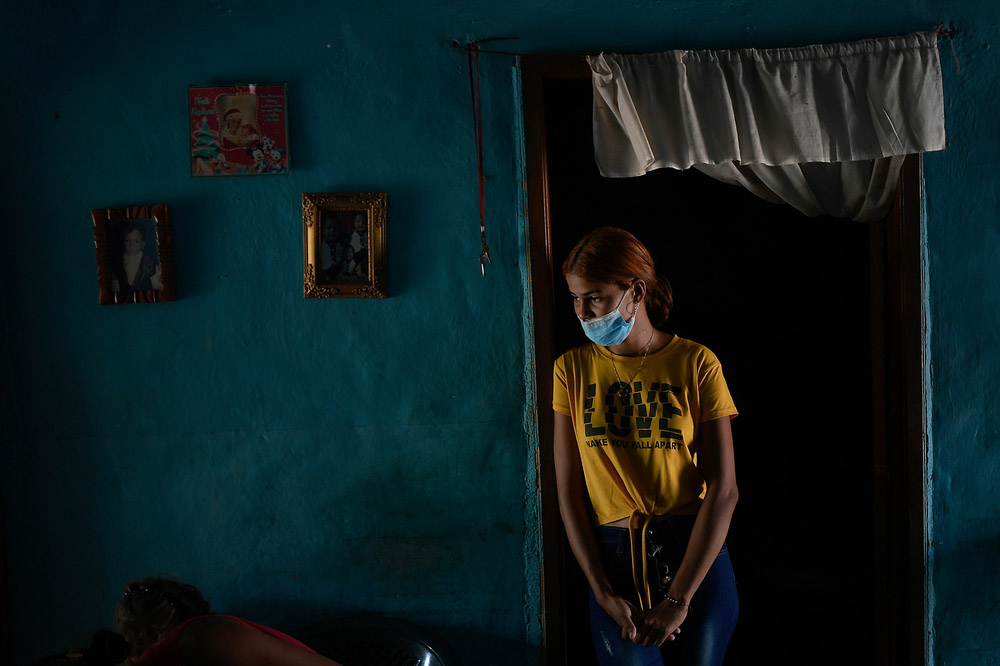
Barbara is 20 years old and has a 24-month-old son. She wants to protect herself from having more babies in the short term, but the economic situation makes access to oral contraceptives difficult. "To buy a box of pills that lasts only a month, I would have to spend two or three weeks working, without spending money on anything else," she explains.
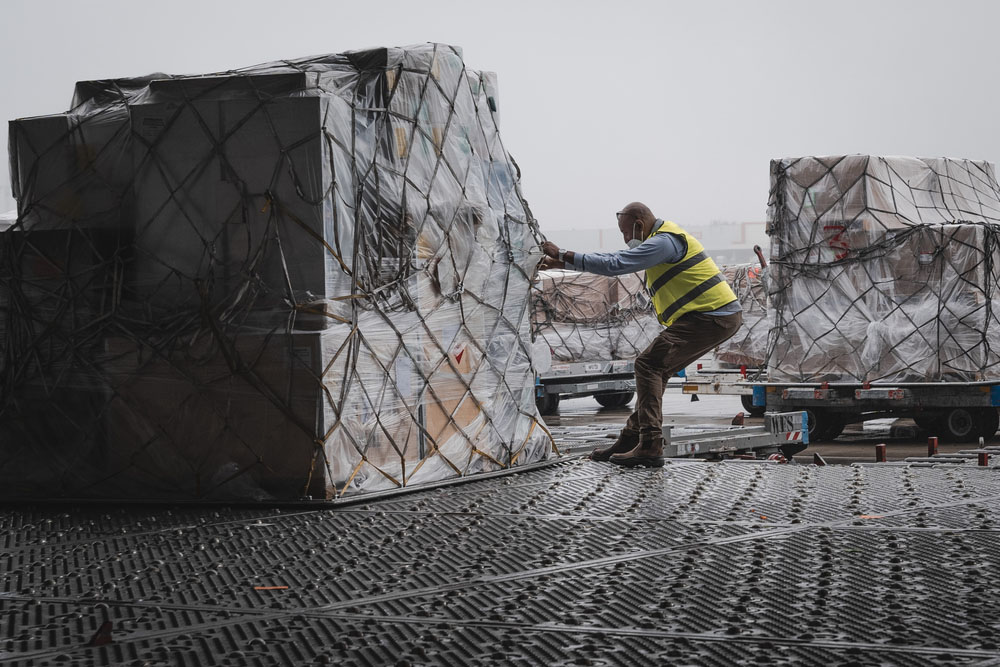
100 tons of material has been loaded into two cargo planes destined for Haiti. The fist plane took off from Brussels on Friday 20 August. The cargo includes items for setting up emergency medical structures and offices for our operations using tents; materials to install emergency drinking water supply systems for 30,000 people; and medical supplies for the care of 30,000 patients, including items for stabilisation, first aid, vaccination and blood collection.
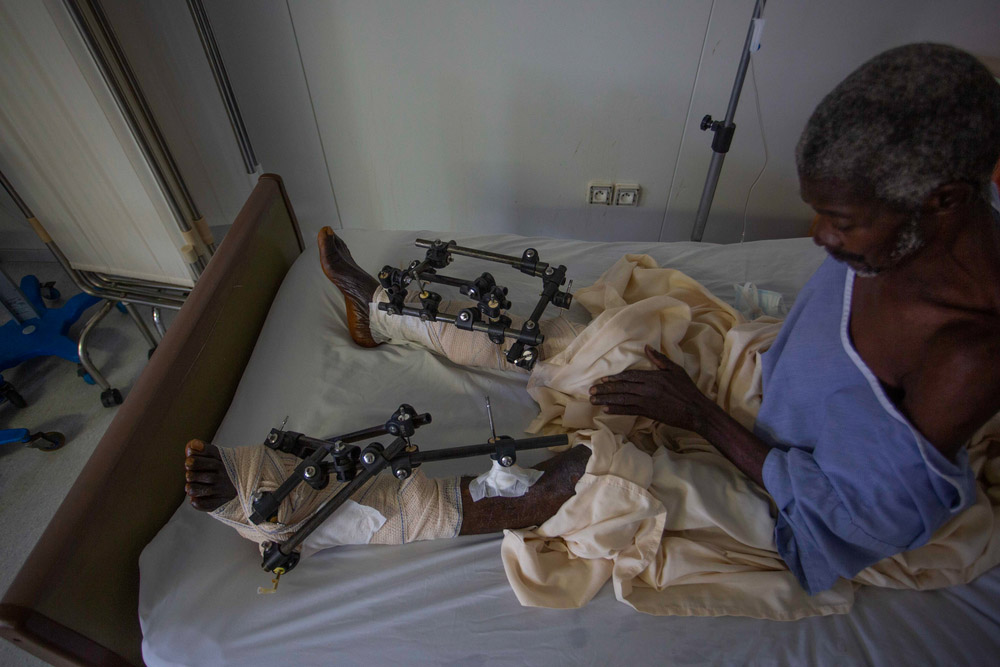
A victim from August 14 earthquake is being treated in Tabarre hospital after a referral from the South area, the most affected zone on Haiti.
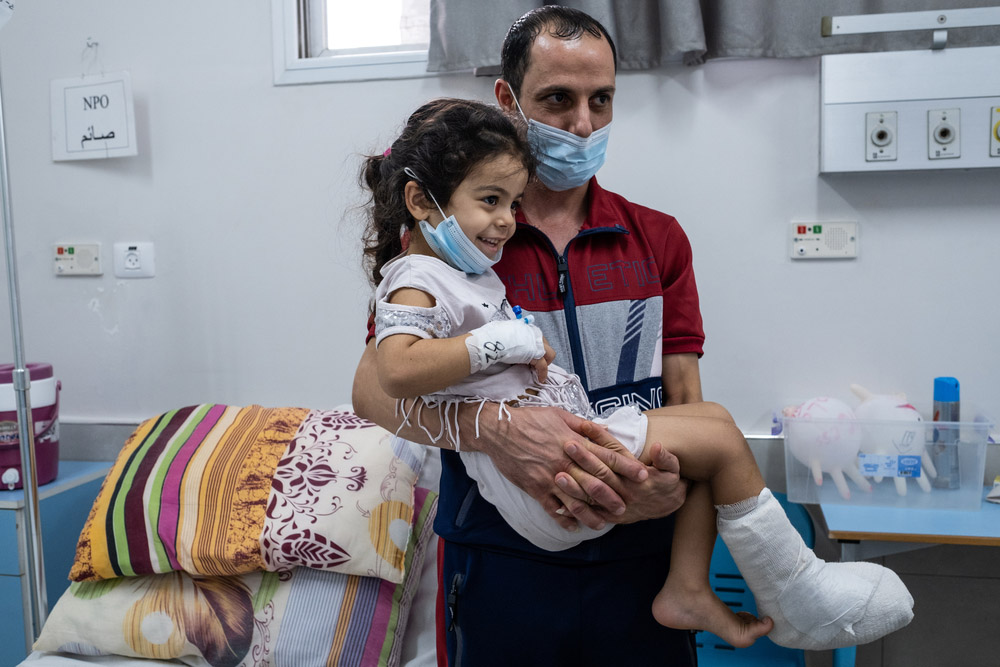
“When I started crossing the street, I saw a light. Then a yellow car hit me and suddenly I was in so much pain,” says four-year-old Hala, as she recalls the day of her accident. Hala’s right foot was crushed by the car and needs multiply surgeries to repair the damage. In 30 minutes, Hala will again go to the operating theatre for surgery. She is nervous and asks her father, Mohammed Aboud, to hold her.
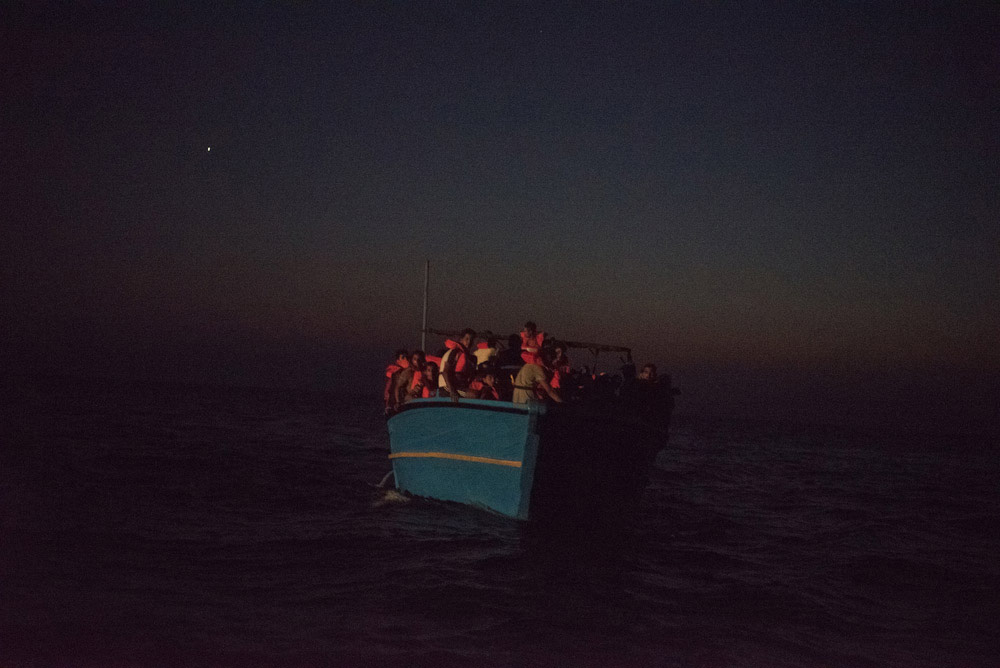
Night rescue of 188 people from an overcrowded wooden boat. Geo Barents, 15.08.21
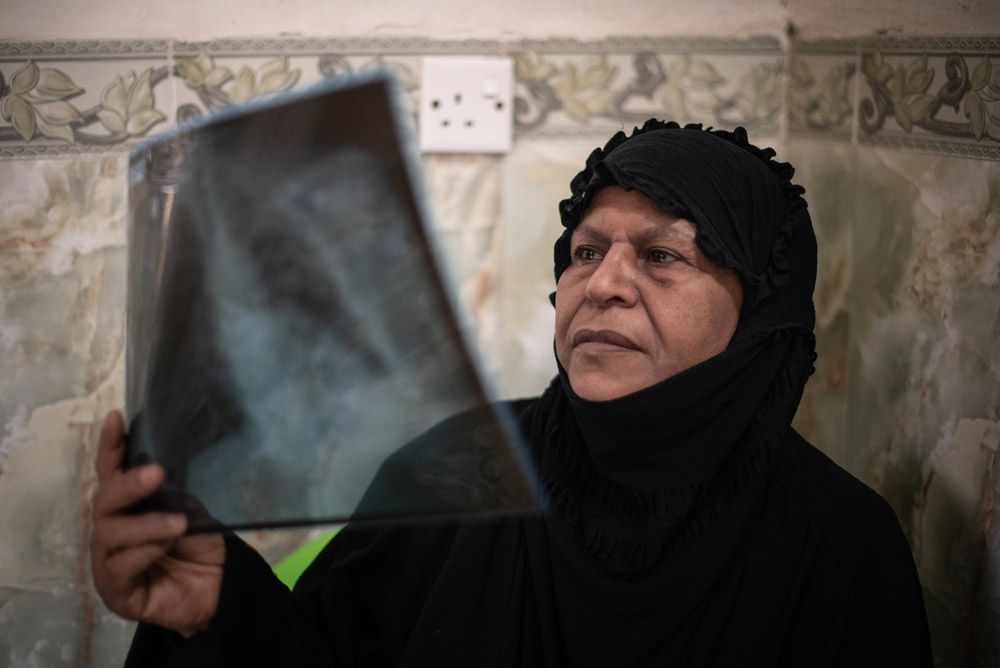
Hameeda, 65, photographed in her home, is Iraq’s first patient to be cured with the new oral treatment for multidrug-resistant tuberculosis. Before starting this treatment, she was having daily painful injections that had the potential of causing serious side effects; like hearing loss and kidney damage. Since her first diagnosis, Hameeda has relapsed several times.
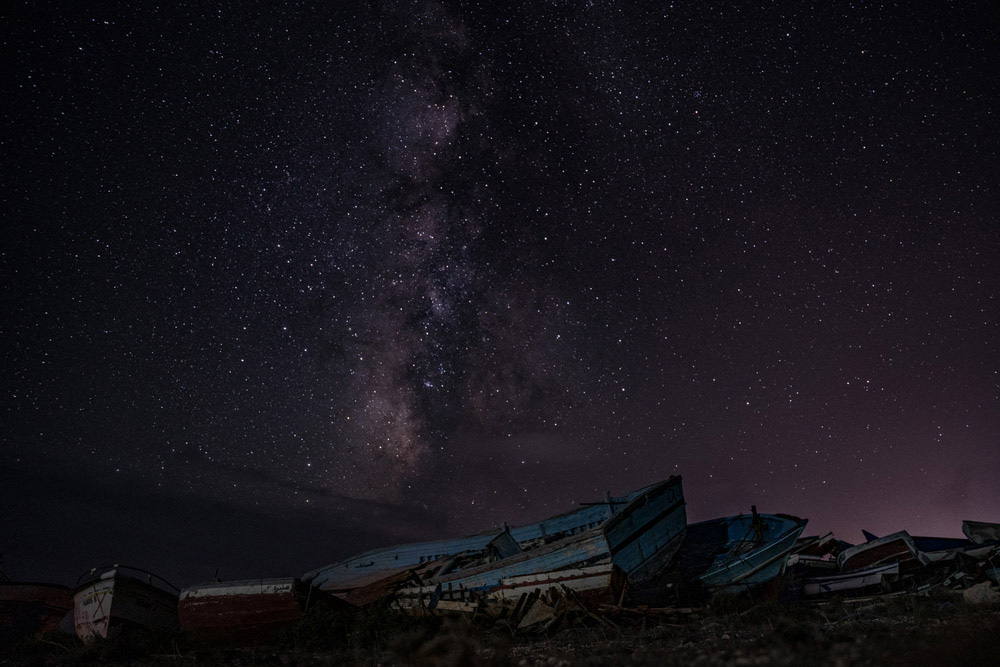
Milky Way rises on the remains of the “boat cemetery” of Lampedusa. The boats used by the migrants are pulled out of the water, brought to the mainland and piled up in strategic points on the island before being demolished.
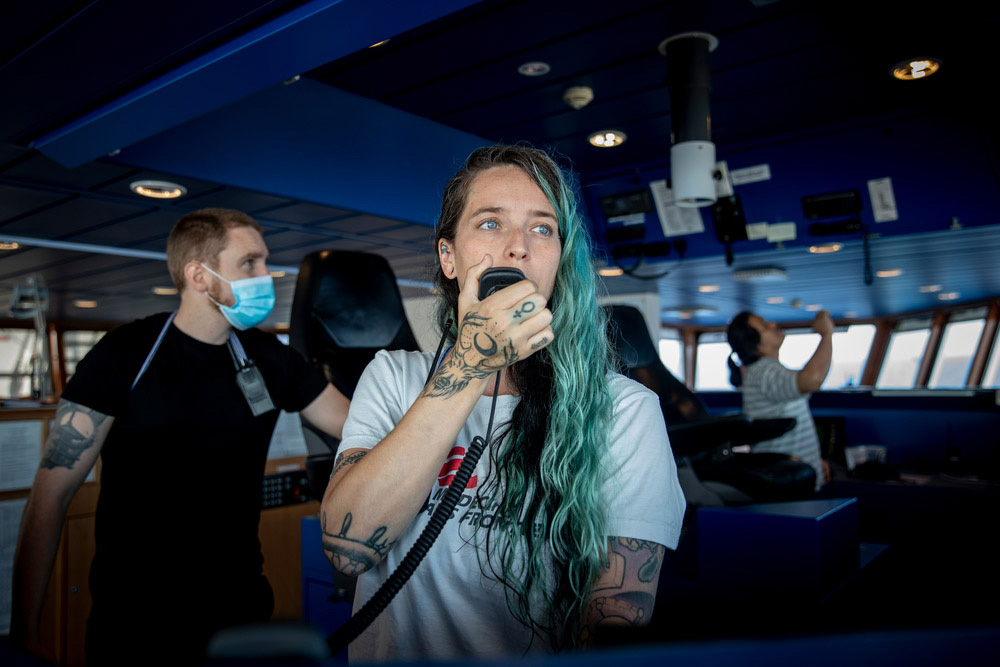
MSF teams communicating with the plane Colibri from Pilotes Volontaires before the rescue.
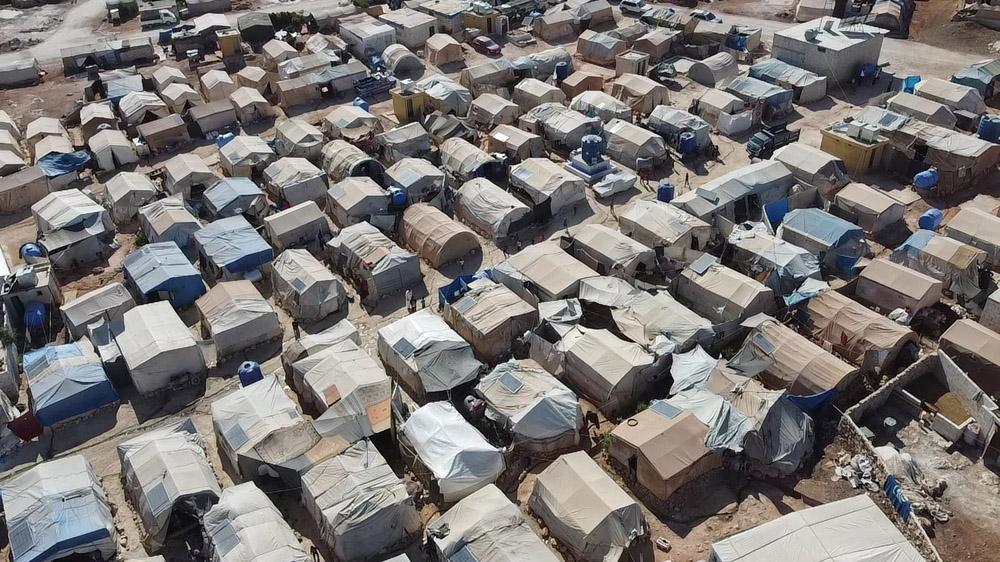
Northwest Syria is home to more than 1.7 million Internally Displaced Persons (IDPs). Most of them have been displaced by the conflict various times and are staying in displacement camps, with very poor living conditions.
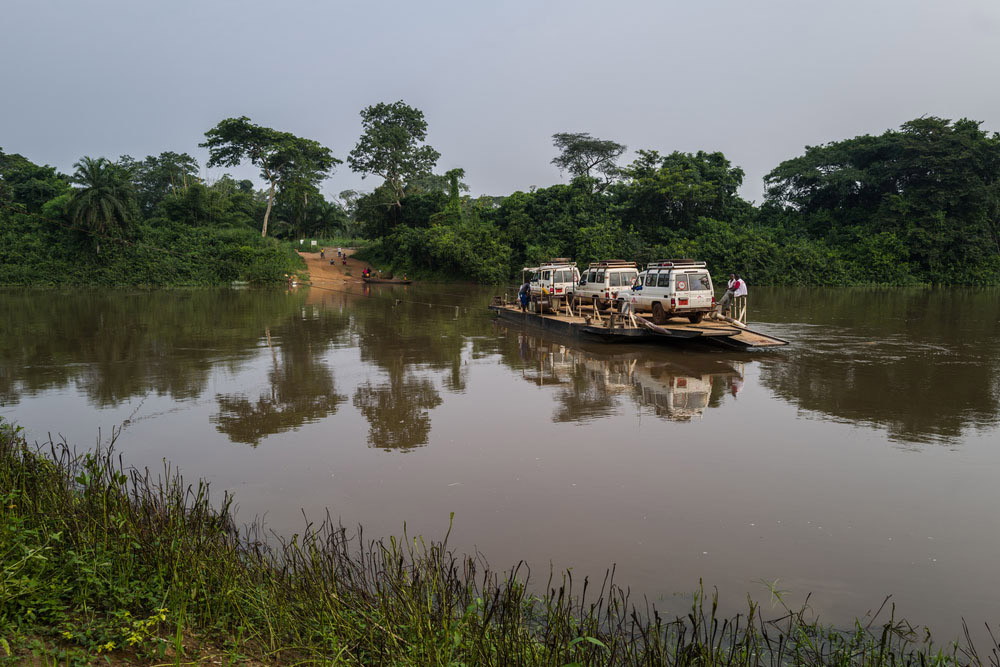
MSF convoy crosses the river on the way back to Bangassou. Thursday July 29, 2021
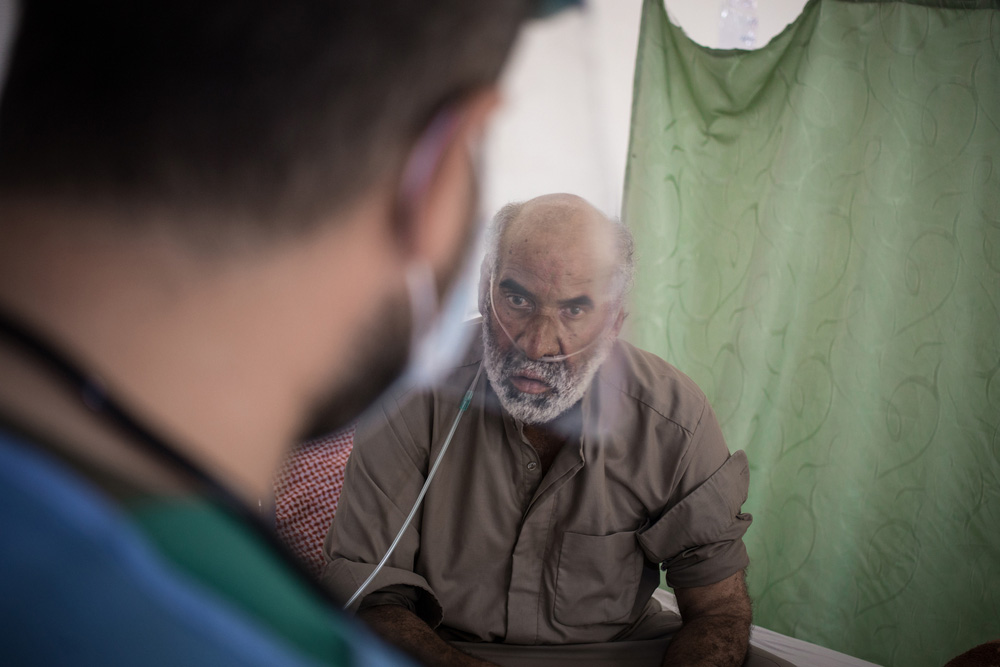
Abdul Harma, head nurse at the Hospital specialising in COVID-19 in Hassakeh, in northeast Syria, provides care to Mr. Ali, who lives two hours away from Hassakeh by road.
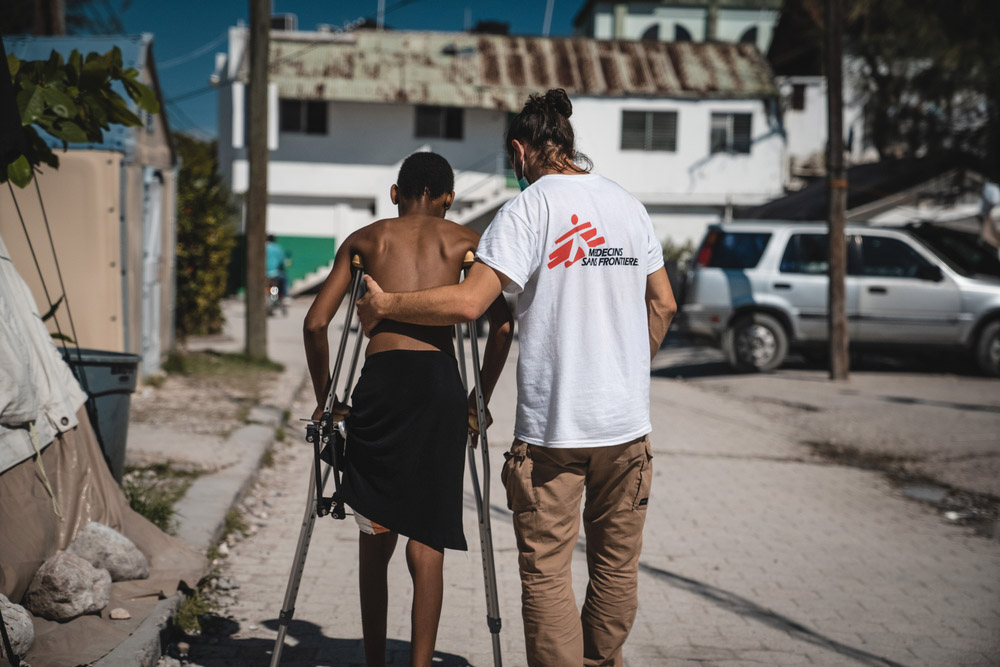
At Hôpital Immaculée Conception in Les Cayes, MSF staff provide physiotherapy for patients injured in the earthquake, helping people regain strength and mobility.
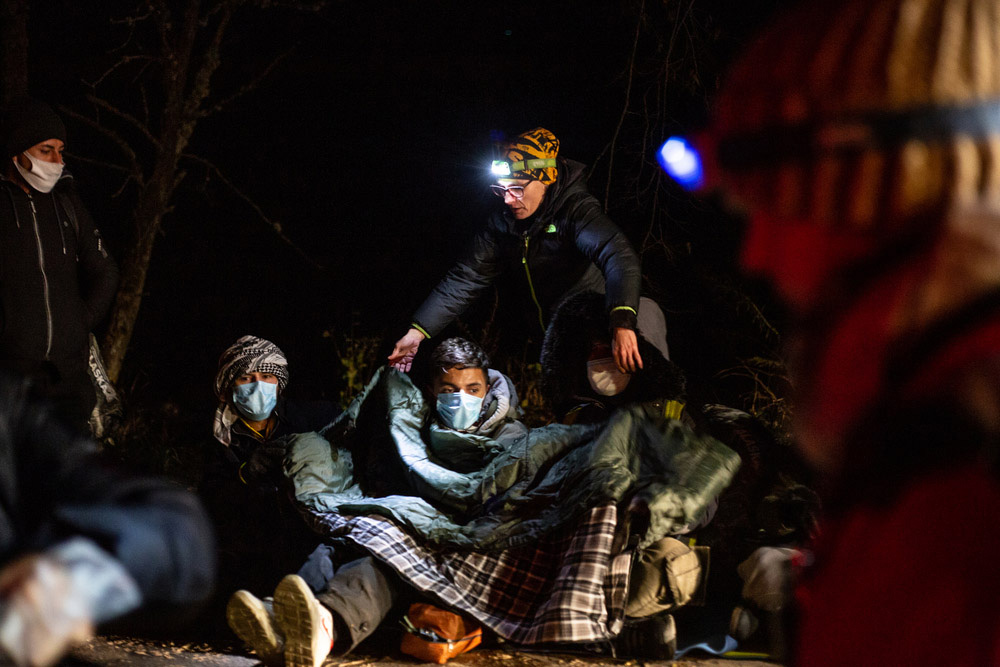
In October 2021, MSF team accompanied Fundacja Ocalenie, one of the local Polish organisations, along with several journalists, into a forested area near the secure zone where they met a group of 13 people. A family of 13 Iraqi Kurds including 4 children asked for asylum in Poland. The family was taken by the Polish border guards back to emergency state zone at the Belarusian border. On the next day, they sent their location indicating that they were back on the Belarusian side of the border.
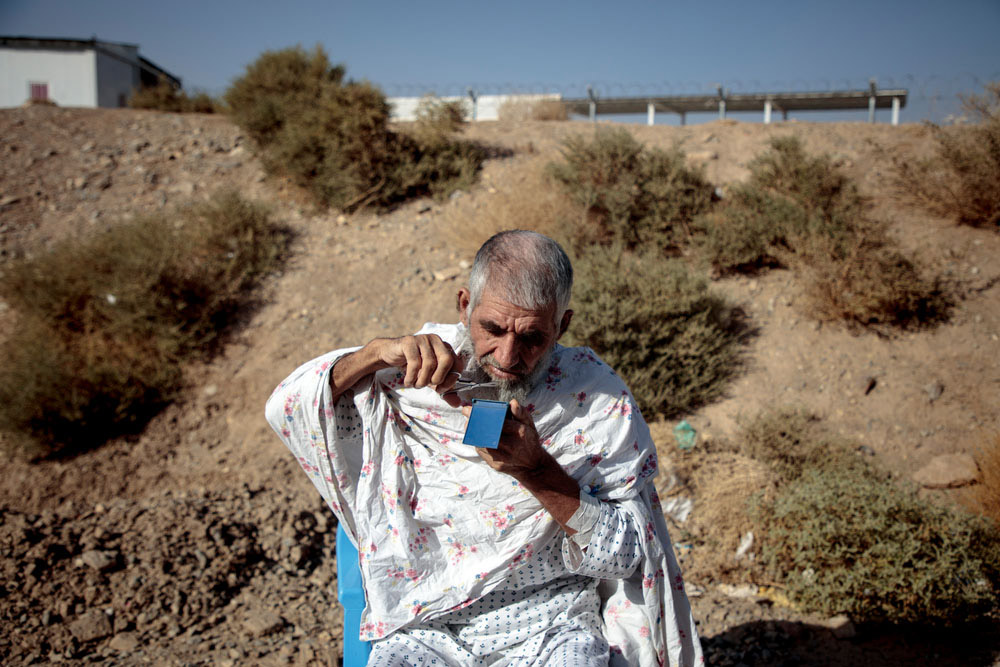
A patient have a sun bath, outside the building.
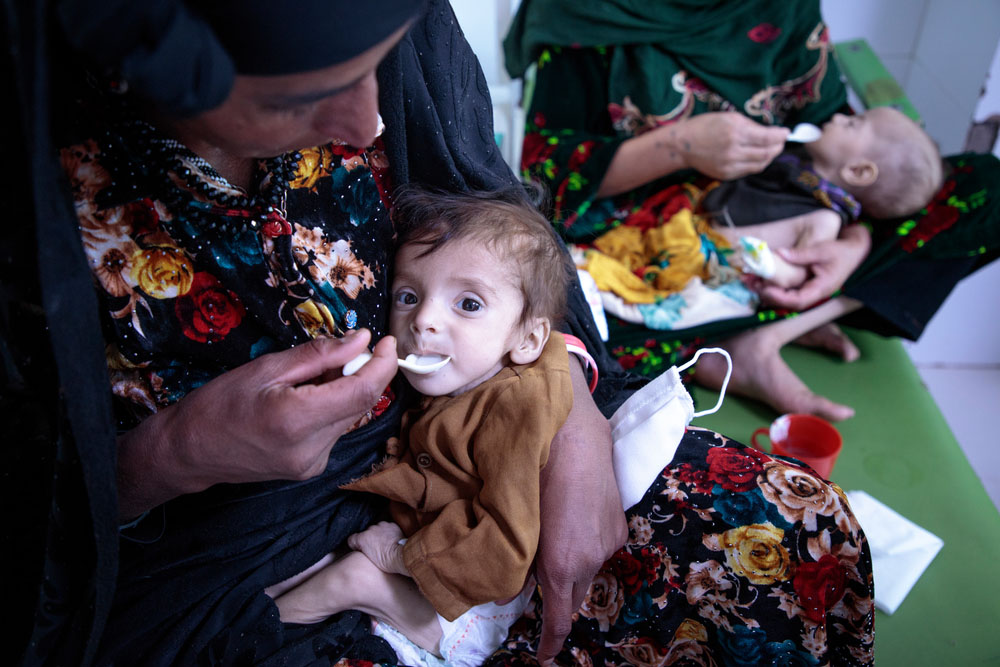
Mothers feeding their child in the rooms of MSF’s Inpatient Therapeutic Feeding Centre (ITFC) at Herat Regional Hospital. The centre is over crowded : there is actually 84 patients for 60 beds, mothers share sometimes one bed for 2 children.
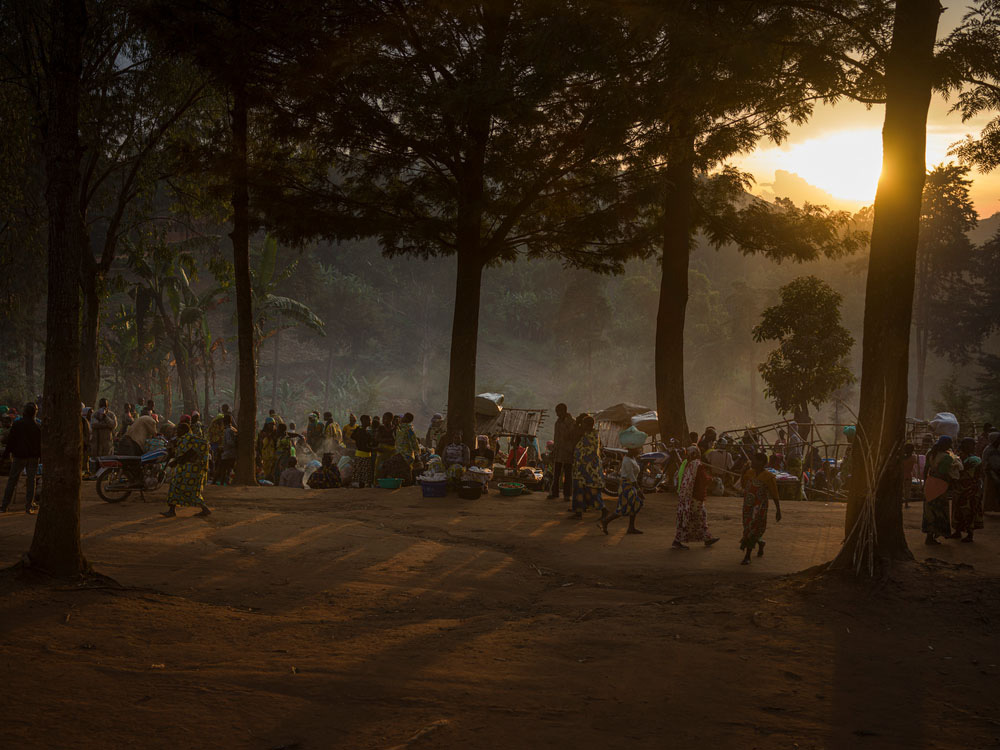
Around the Roman Catholic church of Drodro, a makeshift internally displaced people (IDP) camp named Tsuya has been in place for many years. Approximately 20,000 IDPs live there.
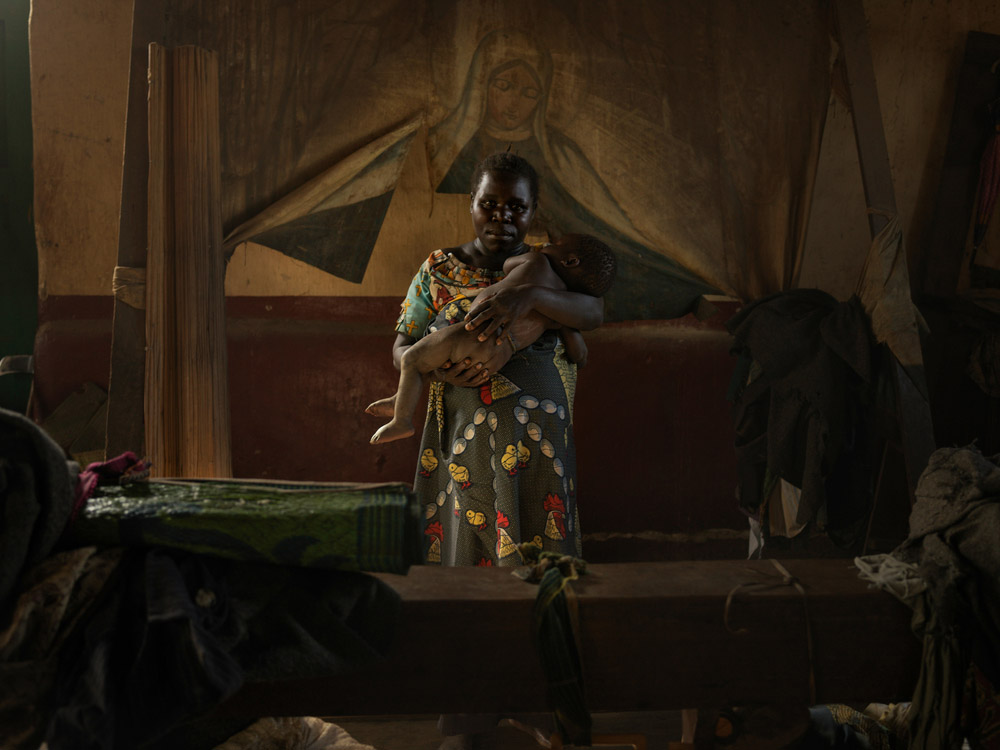
Christine, 30, holding up her baby, a boy. Her village was attacked by rebels, Christine ran away with her seven children and found shelter in the old church in Drodro.
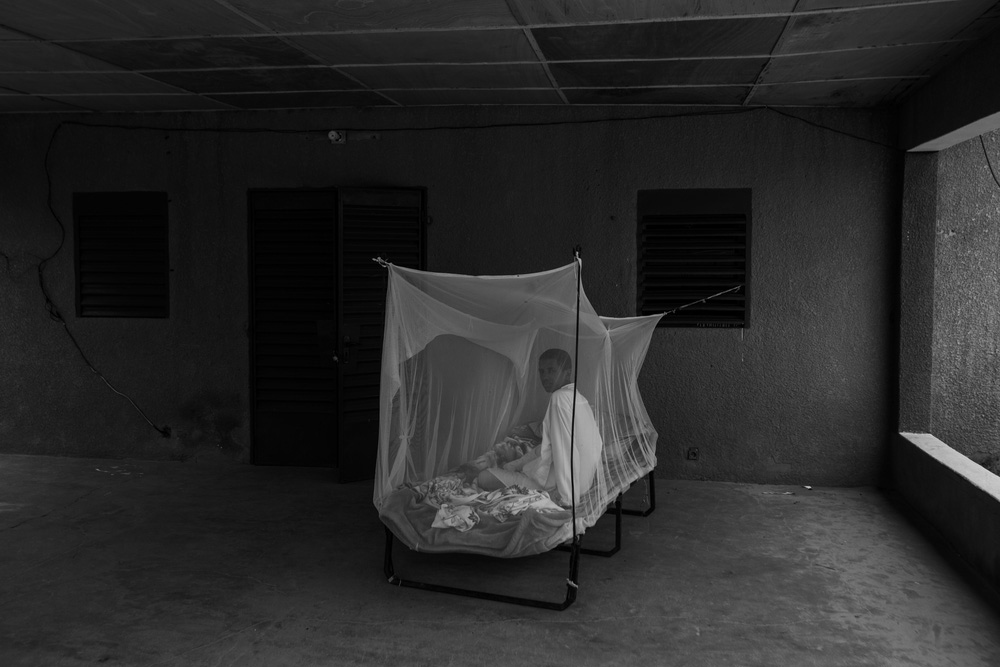
The use of mosquito nets to protect against malaria. Belbeja, Zinder, Niger
